#complex the first few times and just became. like. standard.
Note
I think you missed one member of Rob's crew. Their friend Jason Todd who comes round every so often with pizza and is actually rich or something.
A new neighbor moved in across the hall.
Rob didn't think much of it. People came in and out all the time. Traveling workers, runaway kids, aimless drifters. Half the tenants were squatters at any given time yet here he was paying rent like a total sucker.
He spat into the sink and rinsed. In the chipped mirror cabinet, he inspected himself. His rust-colored stubble was coming in, but not so quickly that he needed to shave today. He shrugged and threw on a clean shirt.
In the living room—if he could call it that, since it practically overlapped the kitchen—Milo entertained the kids with a mobile game while Gene was reading an Edgar Allen Poe book falling apart at the spine. They were the only other permanent residents besides the Steeler family. The rest of the crew came in and out as they pleased.
Rob said, "Kids, did you eat breakfast yet?"
The two six-year-olds nodded. The fifteen-year-old gave an affirmative grunt, not taking his eyes off the screen.
"What'd you have?" Rob asked.
"Donuts!" answered Gunner.
He raised an eyebrow. "Donuts?"
"Jay from across the hall brought them," said Jackie. "He also gave us these special donut hats. Look!"
Paper crinkled as she unfolded a Krispy Kreme hat and put it on top of her frizzy hair.
"I see." He nodded.
"Don't worry, I tested it first," Gene said.
"Thanks."
As Rob poured his morning coffee, he glanced at the box of a dozen donuts. A few of them were missing, naturally, but there was still a wide range of flavors. Next to it was an unfinished thank you card from Jackie, presumably before she got distracted.
Normally, he wouldn't think twice about the neighbors. But this one—this Jay who wouldn't even tell them his last name—had been on Rob's mind since the first "anonymous" free pizza delivery a week ago. Of course, with online ordering there was always a digital footprint, which Mac tracked to the apartment across the hall. After that, there was the "anonymous" Chinese takeout.
Then, Jay started talking to them and it was the standard neighborly conversations down by the mail room. When he asked Rob what he did for a living, Rob answered vaguely that he was freelancing. Gene was unemployed and he could outright say it. Jay also asked the kids what they wanted for the upcoming holidays when the complex residents were setting up the Christmas tree. Jackie wanted a pony and Gunner wanted a monster truck, and for a moment it seemed like Jay was in serious consideration.
Still, Jay was a stranger. As the encounters continued, it became an unspoken rule that either Rob or Gene be with the kids when the young man was around. One could never be too cautious in Gotham.
Rob finished his coffee and debated taking a donut, but ultimately decided against it. He grabbed his jacket, keys, and pack of cigarettes, telling Milo and the kids (mostly Milo) not to make a mess in the ten minutes he would be gone.
He didn't like smoking on the balcony. It was too close to the children and he didn't want them to get sick. Worse, he didn't want them to pick up the same dirty habit that he only got hooked on because he was a dumb kid that didn't know any better.
He trekked four floors down only to find, lo and behold, he wasn't alone.
A cigarette hung from Jay's fingers as he leaned against the brick wall at the entryway. "'Sup."
Rob acknowledged him with a short nod before lighting his own.
Rob glanced at Jay. It wasn't his first time observing but he always liked to note the subtle changes. The young man—about a decade younger than Rob—sported only a red sweatshirt and grease-stained jeans despite the cold. Since last time, Jay had gained a bruise on his cheek and a cut on his forehead just under his white streak. Rob didn't know what his neighbor did for a living other than it left him with a different mottling of injuries every week.
Jay spoke. "Ever heard of third-hand smoke?"
Rob. "What's that?"
"Firsthand is what we're doing right now, basically inhaling these cancer sticks. Secondhand would be if someone was standing close to us while we do it. Thirdhand smoke is the smell left on you after you go back inside and it's potentially harmful," he said. "You have kids, right?"
"The hell kind of question is that? You've met then."
"I'm just saying, you might wanna consider stopping by the laundry before you go back up."
"Fantastic. Another way I'm a shit dad." Rob grunted and took a drag.
Jay flicked some ashes off. "I know a think or two about shit fathers and the fact that you're worried about being one means you're on the right track."
"How can I be a good dad when I can't even provide them breakfast?"
"I asked your older kid and he said it was fine."
"Milo isn't mine and he's not the one in charge. Next time, take it up with me."
"Duly noted."
Rob took another long drag and ran his fingers through his hair, feeling the past two days' worth of residue from not washing. It caked under his nails like week-old bacon grease on unwashed dishes. It was disgusting. He was disgusting. All of him.
The sleeping around. The accidental pregnancy with a woman he barely knew. The fights. Him throwing her out into a rainstorm. Becoming a widower before he turned thirty with two kids who will never remember her. The backbreaking jobs. Not being good enough to not be laid off. The sketchy investment and losing nearly everything. The sneaking, the breaking, the taking.
And the excuses. All the ways he convinced himself he was in the right.
"Penny for your thoughts?" Jay asked.
"I doubt it's worth a even penny," Rob answered. "I've just been wondering lately what my kids will remember me as when they get older. The business I'm in doesn't have a good reputation and I don't want that to be the first thing that comes to mind when they think of me—someone who only takes. I dunno why I'm telling you all this."
"Hey, it's a valid concern. The work I do also leaves me with those types of questions."
"What do you do?" he asked.
"A little bit of everything," Jay replied vaguely. "But back to what I was saying: your kids aren't gonna remember your day job. But I know they'll remember you putting them on your shoulders to hang the tinsel last weekend."
"I admit, you got a point." Rob flattened the cigarette butt under his boot before tossing it in the nearly trash can. "Anyway, thanks for co-hosting my morning pity party, but I have some errands to run. Starting with laundry."
Jay smiled. "I'll see you around."
"Hopefully," he said, smiling back.
There was something familiar about his neighbor, but Rob couldn't put his finger on it.
Ah, well. At least this one came with free food. Rob would be an idiot if he didn't take a donut while the washing machine wrung the smoke out his clothes.
#see previous posts#jason todd#red hood#original character#batman#batfamily#batfam#batboys#batbros#batkids#batsiblings#batman family#dc villains#gotham rogues#dc comics#headcanon#dc fanfic#my writing#fanfiction#fanfic#ficlet#tw smoking#tw swearing#tw food mention#long post
252 notes
·
View notes
Text
They don’t even know of a time when life was better in America. Actually Gen X was the first generation in America not to do better than their parents. The same being true for the last few years of the Boomer generation. Y also is struggling.
The lady Boomers and X’ers remember what it was like before Reagan took over and busted unions in 1980. Wages dropped, factory owners took their shops to the Deep South where unions had long since been busted or never allowed to set up in the first place. Then the oligarchs outsourced their work and shuttered factories nationwide.
Before Reagan one parent working 40 hrs a week at a union job could afford a mortgage, a new car, medical insurance, and college for their 2.5 kids. That also applied to “minorities” or marginalized people who benefitted from union protections and negotiated standard pay scales.
With Reagan a home went from two years salary to 10+ years salary. Tuition did the same. Cars that cost a month’s salary soared to a year’s salary. Wages have remained stagnant for about 40 years. The wealthy paid high taxes and we had everything. Now the remnants of the middle class pay the bulk of taxes while multimillionaires and billionaires pay little or even nothing. Credit card interest soared to over 20% in some cases while Republikkkans passed laws making it easier for those card companies to sue you whilst making it nearly impossible for you to sue them. Mentally disabled people were literally dumped into the streets causing widespread homeless which is criminalized in affluent areas and red states. Guns and drugs flooded the streets. Bigoted white nationalists became radicalized when Reagan granted Australian Rupert Murdoch citizenship so he could open Fox News and then shut down the Fairness Doctrine so propaganda could be spread under the guise of news.
All the societal problems we suffer today began with the birth of the modern RepubliKKKan party led by their racist Dotard Ronald Reagan in 1980. The GOP became an organized crime syndicate and the government became a tool for the rich. The middle class shrunk from a sizeable percentage of the population to a handful of areas in the north and along the west coast. Many foolish people believe themselves to be in the middle class but in fact they are just perpetual debtors.
If you’re young your first reaction might be to blame the Boomers because that’s incorrectly become a marketed belief. The Boomer generation fought against the GOP and its wars, racism, pollution, big oil, corporate welfare, and black hole military industrial complex. They were the hippies and political activists that marched on Washington and other places. They booted the racist Dixiecrats (southern conservative racist Dems) from the Democratic Party while shifting educated liberals left. Sadly the GOP under Nixon and his colleagues welcomed the racists and conservative nut jobs. Don’t fight a generational war when you should be fighting a class/culture/political war.
The younger generation needs to educate itself about the political parties and how life was better just a few decades back and begin to vote. Vote, then organize in the workplace through unions and in the streets to attract more young voters and to counter protest the Republikkkan right-wing oligarch take-over of America. Complaining and taking refuge in the internet won’t turn things around. Become politically active, become stoke, bring back lower tuition, affordable health care, labor unions, workers rights, voters rights, etc.
354 notes
·
View notes
Text
IT'S TIME YOU ALL HEARD ABOUT MY GIRL ARCANGELA TARABOTTI, SALTIEST NUN IN CHRISTENDOM

So, I first heard about Arcangela Tarabotti while I was doing the study for my novella THE CITY BEYOND THE GLASS, which is set in Renaissance Venice and inspired by a real historical practice: At one point during the sixteenth century, nearly sixty percent of all the noble women in Venice lived in convents. And the vast majority of them were there against their will.
For complex dynastic reasons (or basically…money and prestige), only one son and one daughter in each generation of Venetian noble families were permitted to marry during this period. The remaining sons resorted to the famous Venetian courtesans to find the companionship which was denied them in marriage, while the spare daughters were locked into convents. The system was unsustainably wasteful and had to be abandoned within a few generations, but by that time it was already too late - many of the old patrician families of Venice were already going extinct. (You can read more on this in Jutta Gisela Sperling’s book Convents and the Body Politic in Late Renaissance Venice).
While it lasted, the system had plenty of opponents. In 1619, Patriarch Giovanni Tiepolo said, "More than two thousand patrician women…live in this city locked up in convents as if in a public tomb. …They are noblewomen, raised and nurtured with the highest delicacy and respect so that if they were of the other sex, they would command and govern the world."
Even when they have suffered oppression, women throughout history have challenged the status quo, and the women of Venice were no different. Arcangela Tarabotti is the foremost example.
Arcangela was just 11 years old when her father sent her to the convent of Sant'Anna. He considered her to be unmarriageable because she had a physical disability, which she had in fact inherited from him. She would spend the rest of her life there, taking vows as a nun in 1623…a fact about which she was in a white-hot fury.
"Why, then, do you defy the works of the Most Just One by decreeing that many women should live all together, alike in dress, dwelling place, food, and conduct, when the Lord of Lords makes it a miracle of His infinite wisdom for all things He created to be different? Why do you want to bend to your whim contrasting wills created so by nature? It is nothing less than wanting to change and correct the deeds of a Creator who cannot err."
During her early years in the cloister, Arcangela gained a reputation for rebellion and outspokenness. At one stage, it took a direct command from the Patriarch himself to force her to cut her hair. Despite this, Arcangela was able to access a high standard of education at the convent and became a philosopher and writer, corresponding with an impressive network of the thinkers of her day. She wrote multiple works critiquing the misogyny entrenched in Venetian society - including a scorching expose titled Paternal Tyranny.
“Only hell itself bears a likeness to the suffering of these enforced slaves of Christ," Arcangela wrote concerning the Venetian women imprisoned in nunneries. "Over the gate of Hell, Dante says, are inscribed the words ‘Abandon every hope, who enter here.’ The same could be inscribed over the portals of convents.”
Contrary to the polemicists of her day, Arcangela maintained that women were fully equal to men and even argued that they should be able to become lawyers and judges. "Both male and female were born free, bearing with them, like a precious gift from God, the priceless bounty of free choice. If in God’s eyes woman is not less privileged than you with respect to her physical or spiritual qualities, why do you wish her to seem created with such great inequality, you enemies of the truth, proclaiming her to be subject to your impulsive, mad whims? In short, woman is deserving of less respect than you only when you have reduced her to this state by your scheming."
"When women are seen with pen in hand, they are met immediately with shrieks commanding a return to that life of pain which their writing had interrupted, a life devoted to the women's work of needle and distaff," she argued.
Tarabotti maintained that she did not condemn all men simply for being men: "Stricken by a guilty conscience, some men will say that I speak with excessive temerity about all men in general. They are greatly mistaken. If they behave justly, they will be protected from my attacks and those of others. I separate the just from the wicked (who are the subject of my discourse), since not all men are bad and not all women are good."
As a keen amateur historian, I’m accustomed to wincing when people assume that all women living before about 1920 were ignorant, oppressed, and unable to inherit or control property (as if world history was not long and diverse and filled with creative, bold, and influential women). For a limited time during the Renaissance, however, things really were incredibly bad for Venetian women. To find out more about Arcangela and her times, I highly recommend Letizia Panizza's translation of PATERNAL TYRANNY, published in 2004 by the University of Chicago Press!
#history#renaissance history#venice#venetian history#women's history#renaissance women#historical fiction#renaissance#17th century#1600s#medieval women#women in history#feminism
313 notes
·
View notes
Text
->The Lost Painting

La Mesa Herida - (The Wounded Table), 1940 by Frida Kahlo
The Lost Painting
Frida Kahlo's "La Mesa Herida" (The Wounded Table) is considered to be her masterpiece. For a long time it hung in her dining room, before she donated it to the Soviet Union. The Soviet Union rejected it considering it "bourgeois, formalist and decadent."
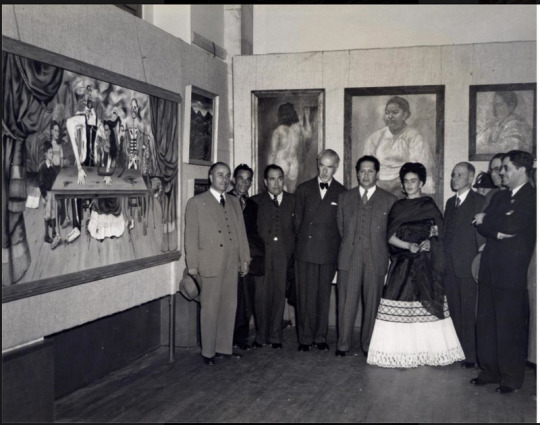
Photo: First exhibition organized by the Seminary of Mexican Culture and installed in the Palacio de Bellas Artes, inaugurated on 20 November 1942.
The Last Supper-like work was sent to Warsaw for an exhibition that would travel around several socialist countries, but the painting never made it past the first stop. "The Wounded Table" considered to be the one of the greatest exponents of surrealism, just vanished.
"The Wounded Table" became a holy grail for Kahlo scholars. It's reported that Kahlo herself lived with bitterness the loss and that Mexico tried by all means to locate the painting with the intention of returning it to the national heritage, but nothing was known about it - until now.
A Galician (NW Spain) art dealer has put it up for sale according to the interest of its owner, a Mexican settled in Europe.
Cristian López Márquez is that person who claims to have ended 65 years of mystery. With two other Mexican partners, he is the owner of the company The Billion Art, dedicated to the sale and purchase of works of art. He explains that, for the six and a half decades without knowing anything of what is considered the masterpiece of surrealism, it passed through two important private collections before reaching the hands of the current property.

The painting alleged to be "The Wounded Table" is in London, in a high-security vault that belongs to a private collection. The photo corresponds to the current status of the painting
Analyzed by experts
The dealer has no doubt that this is the coveted work of Frida Kahlo. Experts hired by his company were in charge of verifying this by contrasting the painting with that of other works by the Mexican artist. He calculates that the value of The "Wounded Table" is between 40 and 50 million euros: "The owner is looking for a buyer within European art circles, in which great collectors of works are made with paintings of this style", Cristian López says.
However, Kahlo scholars argue that López’s claim is dubious at best. Art historian Helga Prignitz-Poda, who has investigated the missing artwork in-depth, says images of López’s find reveal clear differences between the work in question and photographs of the original 1940 painting. Additionally, The Wounded Table was painted on wood, while this painting is listed as a work on canvas.
The newly resurfaced painting bears similarities to inaccurate replicas of the original, potentially suggesting that it’s a copy of a copy, according to Prignitz-Poda.

Visitors at the ZAMEK Culture Centre in Poznan, Poland, look at a black-and-white photo reproduction of Kahlo's lost work, The Wounded Table. Janek Skarzynski / AFP via Getty Images
So the search continues for the Kahlo Masterpiece.
At 2.4 metres long by 1.2 metres high (eight by four feet), larger than a standard door, the painting was unusual for Kahlo, who preferred to work small, unlike her muralist ex-husband Rivera.
This self-portrait was painted during the end of 1939 to the beginning of 1940. In December of 1939, Frida Kahlo and Diego Rivera's divorce became final. Frida started working on this painting as an expression of her despair and loneliness. This is her only other large painting, not only by size, but also by the complexity.

In the painting Frida is surrounded by objects which represent one aspect of her emotional situation. The table has human legs and its surface is bleeding on the few knots. This table is a symbol of Frida's sense of broken family from the divorce. There are several objects around the table. In the center was Frida herself, surrounded by all the objects who accompany her. She looks directly at the viewer, wearing her Tehuana clothes and jewelry, with blood dripping on her skirt, the same skirt she's wearing in "The Two Fridas."
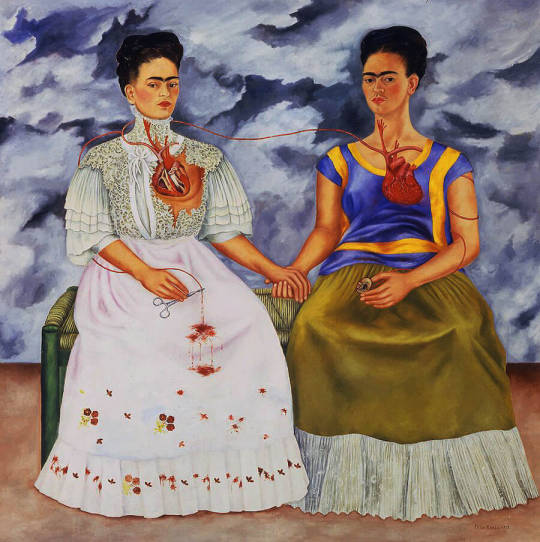
The Two Fridas, 1939 by Frida Kahlo
Her hair are open on one side. A deep wound, no longer bleeding, can be seen on her neck. On one side is her sister Cristina's two children, which is a reflection of her desire to have her own children. On the other side is a deer, one of her favorite pet and she use that as her surrogate children. Sitting right next to her is a Nayarit figure. Frida gives to the Nayarit figure on her left side, a cup containing her last drops of blood so the Nayarit can drink it. The tall Judas figure is considered as Diego Rivera, who plays the role of the betrayal. The characters are arranged in the scene that recalls The Last Supper by Leonardo da Vinci.
Perhaps one day it will be found. Many Kahlo scholars believe it was destroyed, likely burned during the war and lost forever.
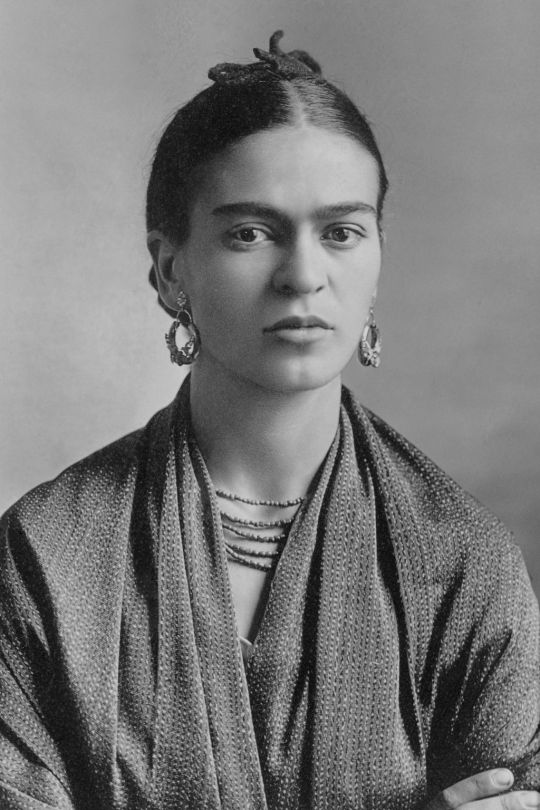
Frida Kahlo, photographed by her father Guillermo Kahlo in 1932
🔽 Bonus Portrait 🔽
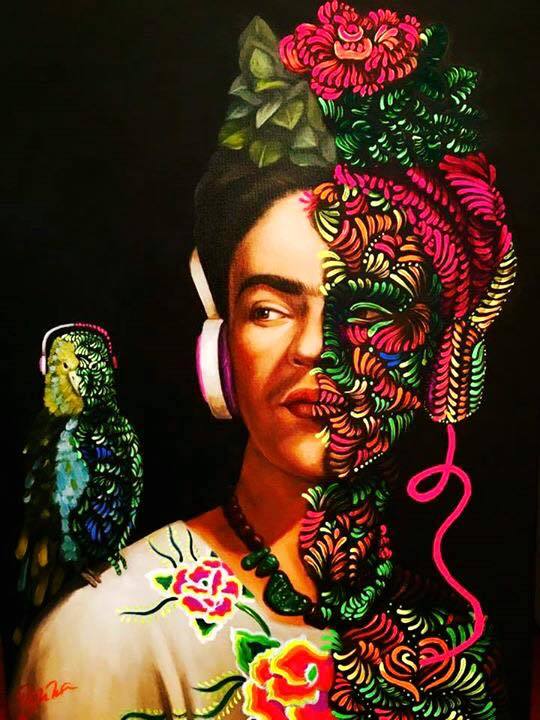
''Dualidad vibratoria'' - ''Vibratory duality'' - Portrait of Frida with parrot. by Yuma Díaz
#art#paintings#La Mesa Herida#The Wounded Table#Cristian López Márquez#Helga Prignitz-Poda#frida kahlo#Guillermo Kahlo#leonardo da vinci#the two fridas#Yuma Díaz#cristina kahlo#diego rivera#kahlo#nayarit#fake#forgery#janek skarzynski
84 notes
·
View notes
Text
I have some news to share ^^
A few days ago I had a revelation while at work.
For over 8 years I've been a big fan of the Dark Souls franchise.
The first Dark Souls felt to me like a journey; a full-on immersion into an incredibly complex world, marked by disparity: old royalty, splendor, trust, hope, magic, nostalgia, wonder, gold, light... but also decay, dread, betrayal, horrors, darkness, death, monsters, disease, anguish.
This game left a deep print on me that hasn't faded. Ever since I played it, fantasy changed in my eyes. Dark Souls I, II and III became a standard, a reference point. Even when I didn't draw as much as I do now, I aspired to one day pay good tribute to the games that meant so much to me! And, of course, I created fan art, but I always felt like I could have given more.
Now.
As you probably know I'm also a big Star Wars fan, specifically TCW fan. And a few months ago I watched The Bad Batch for the first time.
This show left a print in a very similar way as Dark Souls had before. It fueled my inspiration significantly, motivated me and, most importantly, helped me form friendships that I'm incredibly grateful for ♥.
So... the other day, while I listened to some Dark Souls music at work, I thought...
Why not combine my favorite show with my favorite videogame franchise?
So that's it guys. May I present to you:
-The Bad Batch: Dark Souls AU-
That's it! That's my brilliant idea! XD
This is going to be a project, a BIG one. So I would like to briefly (i promise i tried) explain how it will affect my content, under the cut:
(I'll also drop some older DS artwork at the bottom!)
TLDR: From now on I will focus on TBB DS AU as my main and basically sole project . Even if you didn't play DS, that's okay! I will make it people-who-didn't-play friendly, to ensure everyone enjoys the journey. However, if this isn't for you, it's okay to unfollow <3
-I would say that, since I came to tumblr this early summer, my "signature" drawings are the TBB beach episode ones. I have WIPs for this project but I've been feeling stuck for far too long, so I am going to put it on hold. In fact, I am going to put on hold virtually everything that I was planning on doing, with a few exceptions. This means that I will rarely draw anything outside this AU.
-I am CLOSING commissions. I found that they put a kind of pressure on me that doesn't feel too good, and, honestly, I'm lucky to say that I do not need the money at the moment. I'm still open to requests, though, so don't hesitate to send anything and I'll draw it if I feel like it :) I'll even try to set up a store at some point!
-The project will consist on three journeys, featuring the 6 members of the Bad Batch, and corresponding with the three Dark Souls games. Each of those journeys will, more or less faithfully, follow the events of EACH season of TBB, adapted of course to the universe of Dark Souls, AKA Dark Medieval Fantasy. This means that, until the third season of TBB is released, I won't make any DSIII-related drawings.
-The journeys are adapted to the universe, and thus, will follow the real player journey as faithfully as I can, staying within DS canon and allowing people who have played the games to enjoy my drawings. However,
-THE DRAWINGS WILL BE 100% NON-DS-PLAYER FRIENDLY. I know that my followers are not DS fans but TBB/TCW fans. I am NOT here just to please DS fans. I want TBB fans to enjoy this journey, without having to google meanings or go easter-egg hunt to understand what is happening. I will tell a story and you will only have to enjoy it.
-This is a project for myself. Both DS and TBB mean A LOT to me, and this idea had me vibrating with excitement. I am making this project to PAY TRIBUTE to two things I love. However that does not mean that I will neglect the very people who have motivated me to keep creating. I promise to still deliver my very best with every drawing.
Do not hesitate to unfollow if this isn't for you.
I can understand that some people might follow me only for my wholesome beach episode drawings or for regular, HC TBB content. And that's okay. That's what this announcement is for! To let you know. This community has given me so much and I want to give back. And if you do stay, I can almost 100% assure you that you will enjoy what's to come!! <3 It will be a long but satisfactory journey.
I'LL BE POSTING THE FIRST DRAWINGS IN THE UPCOMING DAYS!
OKAY, SORRY FOR THE WALL OF TEXT!!! 😖
Here are some older DS drawings ^^ (jesus I have way more than I thought and these aren't even all of them)


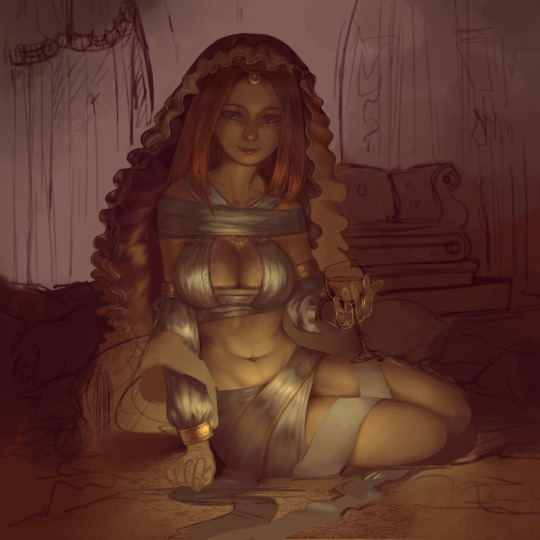


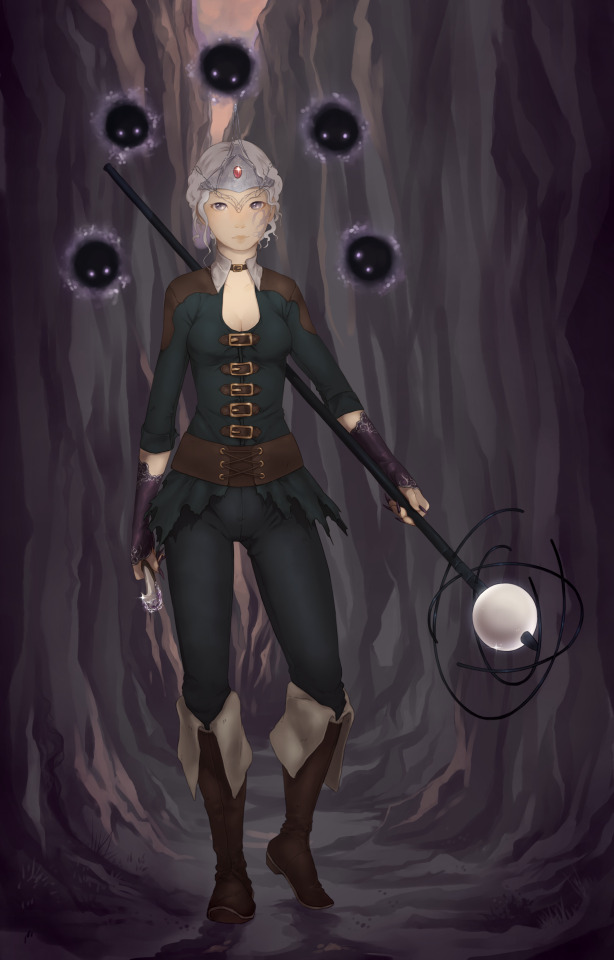
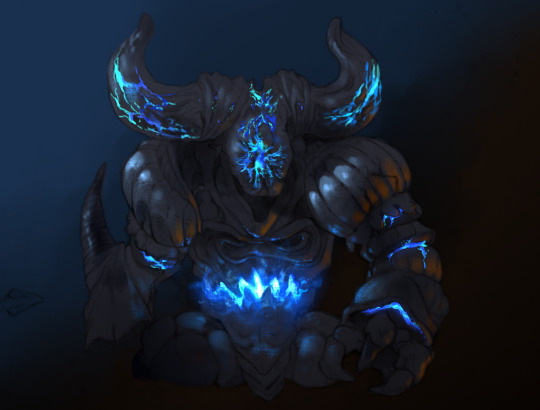
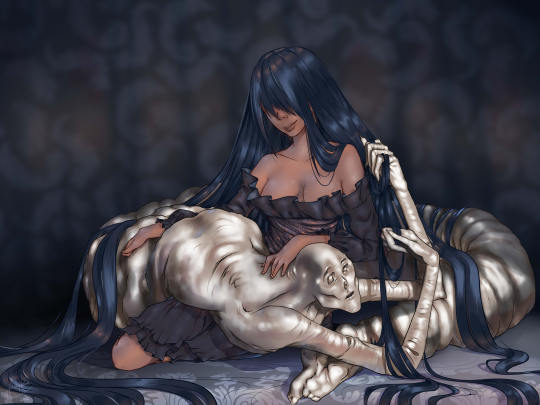

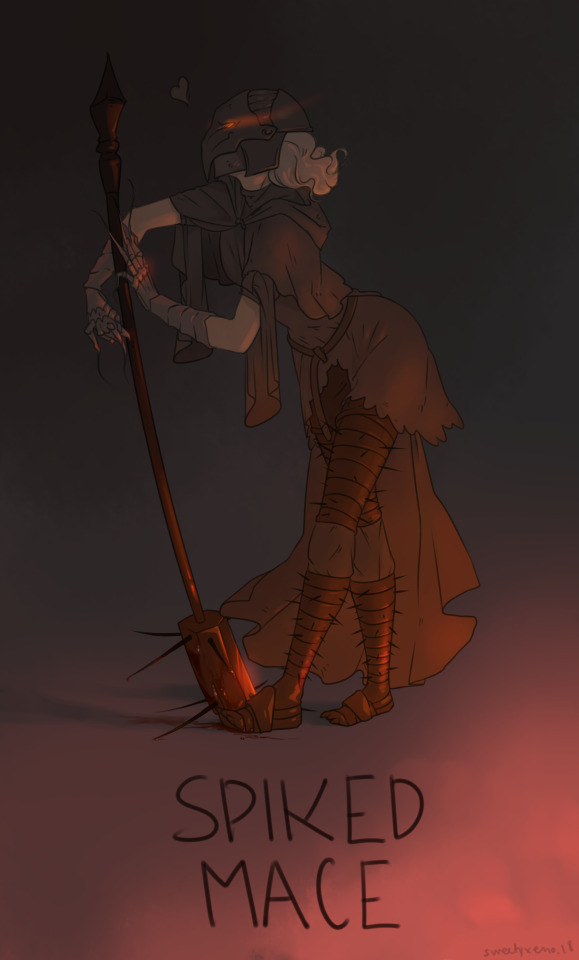
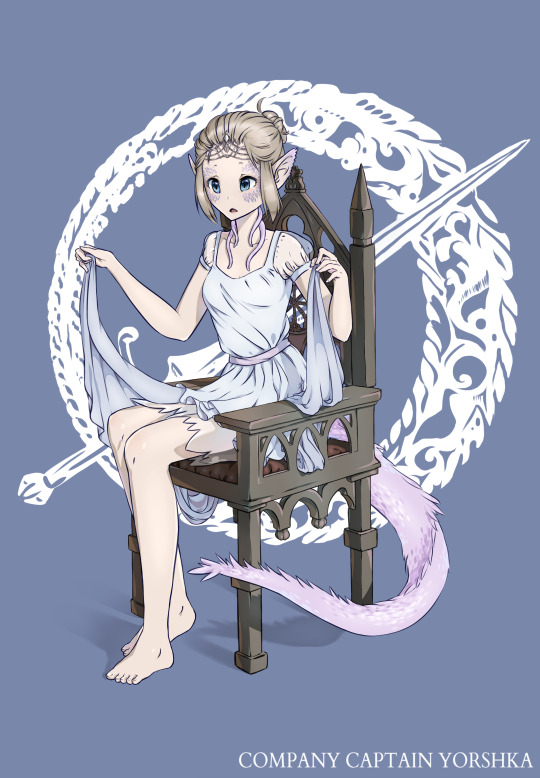
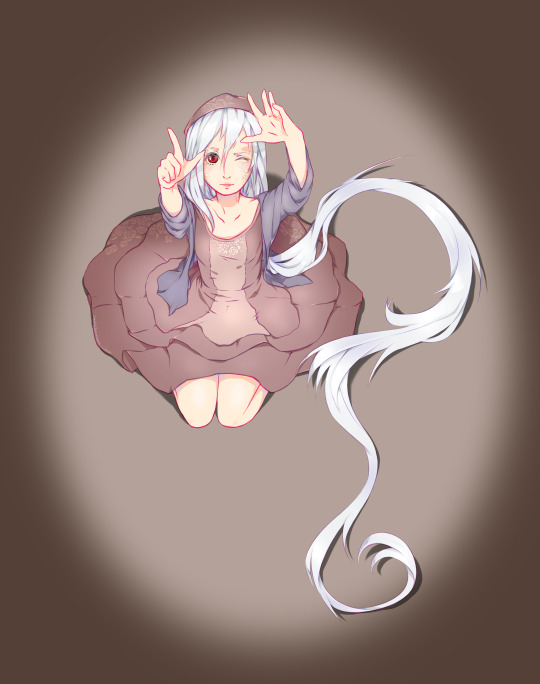
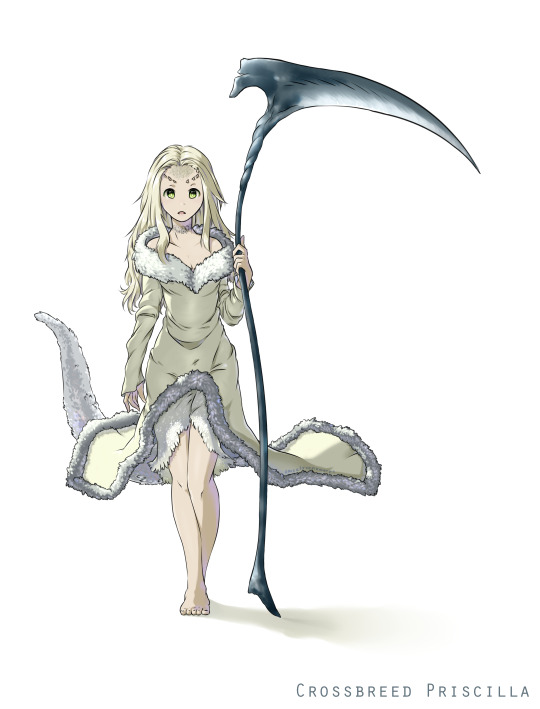



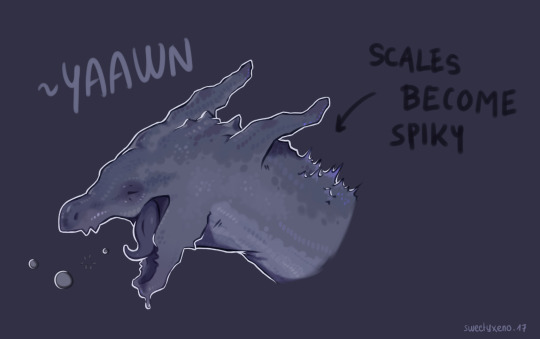
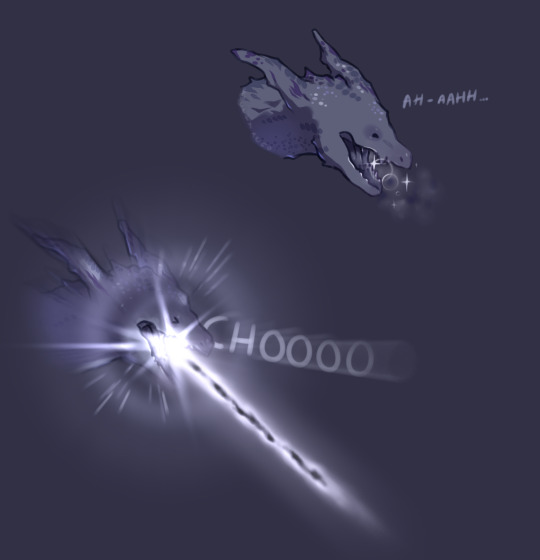
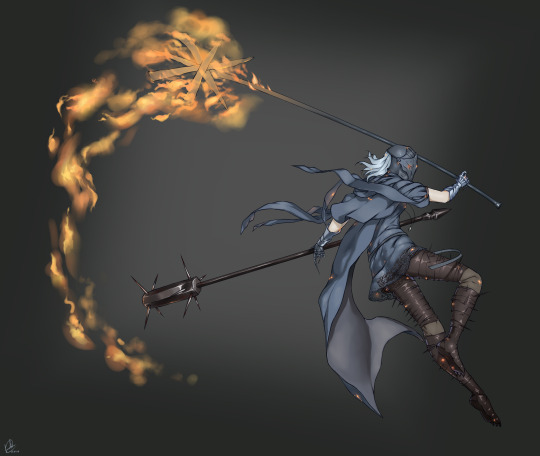
AIGHT. NOW YOU KNOW IT'S SOME SERIOUS SHIT WHEN I SAY I LIKE THESE GAMES.
Anyway. Including a taglist, because I think it would be unfair not to let you guys know about this project in case anyone wants out (or to not be tagged). Send me a DM if that's the case, it's NO PROBLEM!!! I wouldn't want to tag someone who doesn't want this content.
ALSO PLEASE, ANY QUESTIONS YOU MIGHT HAVE, TOSS THEM TO ME! And thank you kindly for making it this far <3
@dukeoftheblackstar @justalittletomato @darthmaulshispanichousewife @botherbother-blog @aftergloom @badolmen @ihaventpickedausername @ohboi @stardustbee @nik-barinova @the-chains-are-the-easy-part @gen-has-green-vibes @ejfivercommander @herbalinz-of-yesteryear @eyecandyeoz @noesqape @lune-de-miel-au-paradis @staycalmandhugaclone @callmesunny04 @freesia-writes @ginnymilling @sunshinesdaydream @sev-on-kamino @cloneloverrrrr @moon-wrecked @idontgetanysleep @tech-aficionado @followthepurrgil @renton6echo @queen-jiru @shoe-bag @eyayah123 @eloquentmoon @and-loth-cat @ladyzirkonia @stardusthuntress @bambambunny @morphofan @gt13tbbart @amalthiaph @cameronirat @nobody-expects-the-inquisitorius @anxiouspineapple99
51 notes
·
View notes
Text
I never felt comfortable around my parents, and they knew that. I was never close to them, I didn't open up to them and I wasn't tactile with them either. They convinced me for years that this was a personality fault of mine. That normal people like to open up and receive physical affection and I was just wrong and needed to learn to be right.
This was until I was 11 or 12. When I made my first best friend. Her name was Lucy and she mattered so much to me, it felt easy to open up, to be near her as often as I could be, to hug and show physical affection to her. We were literal children so it wasn't even a romantic thing, I was just so used to being iced out at home and shunned at school, Lucy was the only person I felt safe next to.
My mum was seething jealous of my relationship with that little girl. She was angry all the time, she'd make ugly, jealous remarks. It was around the time my mom truly started to hate me, so I'd never felt so hurt and so rejected by my mum in my life, it was the most emotional pain I'd ever been in and it just made me cling to Lucy even more.
Oh my mum was completely overjoyed when my relationship with Lucy started to crack. The abuse at home got so much worse, perfectly timed around the days I'd see Lucy the most, so I'd be shaken up and miserable when I saw her.
I started getting punished for Lucy's actions, even when they had nothing to do with me. Looking back now I wish I knew better, I just seemed pathetic and jealous, but I'd beg her to just not let my mum know. It seemed like such a small request to me, surely you can not snog your boyfriend for the two hours a week you're in youth group with my mum? How hard is it to just wear modest clothes when you know my mum will see you? She had seen glimpses of the awful at my house, why wouldn't she just behave to the standard my parents expected of me to save me trouble?
The thing is Lucy had a normal family, she got to grow up. I was like a weed with no sunlight, all spindly and twisted. By the time we were 14 she was mature and clever, and I was insecure and stunted. She didn't deserve to be the emotional support person of a person who wasn't going to grow with her, so she outgrew me and left me behind.
It hurt but both our lives were better for it. She got to shake off the sad pathetic girl who ruined everything, and I got to enjoy a good few months of my mother treating me like a person for the first time in years.
The absence of Lucy became the absence of my mother's jealousy. That meant no more Friday evening beatings over nothing. That meant no more cruel comments and emotional warfare. It meant on occasion, when her husband lost his shit with me, my mum might have even defended me.
I felt so light for the first time in a long time. Yes, I was absolutely wounded that Lucy left, but soon enough I was eating breakfast without flinching. I'd spent years shut up in my bedroom because my parents didn't want to see me, now I was being taken places and spoken to. Not just spoken to, spoken to with respect and even kindness. You don't realise how important having regular, neutral interactions with other people is until you've spent years where for months at a time the majority of your human interaction is negative.
I'd spent years in a cycle of abuse from my parents and running to Lucy for reprise, now I felt like I was surrounded by stillness. I kid myself into believing that this was it, I was safe now. It had been awful all of my life but now I had loving, caring parents who had changed for good. It was because of that break that I was able to grow too. I'd been stunted since my preteens in the awfulness, but in the few months of good I had, I got a chance to catch up.
I became mature and clever too. I became empathetic and complex and compassionate and self assured. I learned to be confident enough in myself I could take criticism, I had the hindsight to see what happened with Lucy and I understood she had to move on, but it was okay to hurt too. I realised that I wasn't cold, or secretive, or emotionally broken, that my parents had created a broken environment but unrealistically expected me to be perfect despite that.
And at around 8 months, when I thought this was it. I thought I'd traded in my friendship with Lucy for a perfect home that would never be awful again, my parents hit a rough patch, and I was in the cross hairs, and it got awful again, and I didn't have a friend in the world to lean on this time.
#narcissistic abuse#raised by narcissists#vent post#toxic parents#complex trauma#toxic mom#parental abuse#dysfunctional family#childhood trauma#dysfunctional household#childhood abuse#traumatic childhood
12 notes
·
View notes
Text
I don't think I have a ton of followers, but for those who are here, below the cut is basically a very long think piece on jcink skinning that will probably offend a lot of people, but it's my honest take and I'm willing to hear other people's constructively expressed criticisms, and am very open to revising my opinion. I just was surprised by the SOPs I found in the jcink rpc when I started writing this skin and was doing research into whether I wanted to try selling it or not.
For anyone wondering about the future the TLDR is as follows: I will probably make another skin and sell it as a multisale and see how that goes. This will probably happen a long time from now. I will probably never take custom commissions. I will probably charge more than people would like for my skins, but I think I have good reasons for that. More below the cut on the actual thoughts.
There were a few obstacles that became immediately obvious when beginning to work on a jcink skin for the first time.
First off, jcink is imo fundamentally bugged.
It has a slow initial load time even on the default skin, always over a second, usually over 2 in my testing. Industry standard is .5, and php (the backend language of jcink's templating system, and i assume the databases), though old, is perfectly capable of meeting that threshold. I personally find this an infuriating fact about jcink, especially since I can do nothing about it.
There are two distinct skins on any site by default, neither of which are responsive. Responsiveness basically refers to whether or not a website looks good regardless of screen size. It's a universal concern in any modern tech company. I understand that when jcink was first written, a lot of what's possible today wasn't available, however we are long since past the time (in my opinion) that it would have been simple for John to reskin the default view of jcink to be responsive and provide that as an alternative to the og defaults. If nothing else, this would provide a better standard for what a 'functional' skin might look like, and maybe even a baseline for people to build off of. Instead we have tables which are generally unusable in modern web design.
Jcink is also not terribly accessible by default. I found text labels missing in several places (for screen reader users), no keyboard accessibility on a few default functions (for people who can't use a mouse), and of course, nothing in the docs to remind people to keep what features there are in the default skin.
Then we have the added complications of the jcink rpc community, the skinners and coder in general within the space. I think I can break down my thoughts on this into three main categories: Price, Product, and People. I have a lot of thoughts about these topics, so bear with me.
Price
Look me in the eyes. Not one single skinner I could find was charging a market rate for front end web development. The most expensive person I could find wasn't even asking for 25% of the money a front end website developer would make for a skin professionally, and I found them because people were putting them on blast for charging as much as they did. The jcink rpc has been getting bargain basement prices on code for EVER, and seems to have NO concept of the time and complexity of writing actually good code.
I have mixed feelings on this.
I have not seen a professional grade skin in the wild, not once, not even my own. The css on my skin is sloppy. There are areas I got a serious case of the fuckits on and wrote some ugly code. There's at least one info page on my site that looks weird af on mobile and I have no intention of fixing it. I say this with love, compassion, and appreciation for everyone who codes for this community. Not one single jcink skin I have ever interacted with would constitute a professional level of work in my field. No one whose work I have interacted with (again, including my own!!) should be charging a fully professional rate.
This is a hobby. We do this for fun. We shouldn't be in an arms race for the prettiest skins, but we are. People like nice interfaces, it will affect their decision to consider or nope out of a site. So, we're in a situation that for a 'not boring' skin, custom skinning has become much more of a norm. In order to have a successful site, admins generally need to invest in a decent skin. With a custom skin, you can easily get to $250 in cost, and I've seen it go quite high from there. That's a lot of money for a site which may not survive. That's a big fuckin' deal. Some people are serial site starters so if one fails, that's fine, the skin can be reused, but I personally have not adminned a site since 2016 until a month ago. If I had sunk $250 into a skin, plus $80 for jcink premium for a site that never took off, suddenly my 'free' hobby becomes quite dear. I think it's only right that there be a certain degree of friendliness in the community when it comes to pricing because of this, even for truly professional coders (again, of which I've seen zero). Skinners are part of the ecosystem and deserve to be properly valued. Admins shouldn't have to pay out the ass just to have a better chance of their site taking off.
There's a great deal of risk involved in most skinning transactions I know of. First off, unlike the real world, we often don't know each other's irl identities. This makes a situation rife for scammers on both ends of the transaction- from skinners not getting paid for delivered work, and customers not getting the product they asked for, if they get it at all. This rightfully affects both parties' feelings on how to adjust pricing to account for risk. If you're a coder, prices should be higher, if you're an admin, prices should be lower. This has been more or less solved for multisales with payhip etc, but custom skins are still fraught, and in a world where plenty of players won't consider a site if they've seen the skin too much, that is still a significant chunk of the activity at play.
So do I think skinners should be paid fully professional rates? No. From what I have seen and learned, absolutely not. It didn't occur to me to track the time spent on my skin until quite late in the process, but if I had to guess I'd put it at about 40 hours worth of work. I'll talk more about this in the product section if that seems like a lot of time to you. I'll throw out a very loose figure and say that $50/hr is about right as a figure for what a professional developer would make doing this kind of work, after tax etc. If you're being responsible about the IRS, it would bump significantly higher. If you multiply that by the 40 hours I spent on my skin, we're getting into multiple thousands of dollars for a custom skin if people were charging professional rates. Now it's very possible that if I made skinning My Thing, that I'd build up a library of components I could pull on to make skins much more quickly. I know for a fact that many skinners do. But even if we say I halve my time on my second skin (optimistic but v possible), we're at $1000 if I was charging the prices I charge my employer to keep me on board. That is CLEARLY unsustainable for a hobby centric community where money never gets involved.
So what should pricing look like? I really think that depends on the product.
Product
So. I think there's some room for honest reflection in jcink skinning communities about what is being sold. To contextualize this, I have to lay out the basics of what my general mindset is around what makes a website good for its users.
The obvious one, and the one that I think gets the most attention in jcink skinning is aesthetics. How a site looks, whether it's pretty, etc. I think this is important, I care about things looking good, but out of these five concerns, this one is frankly last on my list of what's important.
UX Design/Functionality. No, this is not the same as aesthetics. Is a site easy to understand, use and navigate. Does it make it seamless for a user to get where they want. Does it provide the contextual information they expect from the page they're visiting. These questions are fundamental for me, and I'd rather have a well designed user experience, than a well designed asethetic experience on a site.
Accessibility. Is a site readable. IS A SITE READABLE. IS A SITE READABLE. Is there enough contrast on a page that a colorblind user could read it? Can you navigate it with a keyboard? How about a screenreader? Is the text large enough for standard screen sizes. Does it stay large enough across devices?
Responsiveness. If someone on a phone visits my site, will they have a good experience in every view? Will they have the functionality they need? What about a tablet? What about someone with a small desktop screen, or a huge one? If I have hovers somewhere on my site, is it still navigable on mobile, or is it now an unintuitive situation? Phones take way longer to load than most computers, do all the assets (gifs, images, multiple fonts, etc) on my site make it frustrating for a mobile user to visit my pages?
Performance. When I said jcink is bugged earlier, performance was one my complaints. The base page load time of jcink is shitty. However, what's worse is when a skin takes a baseline of 2 seconds for pages to load, and bumps it up to 5, 8 or (the worst I've seen) 13 seconds to load after someone tries to visit a page. I have not seen a single jcink skin (aside from my own), which adds less than a second of loadtime to jcink's default performance. Again, in an industry where the basic standard is under half a second, jcink skins do not perform to a professional level.
If a website fails along these metrics, it cannot be considered professional for general public consumption. The problem is, everything except aesthetics requires a considerable baseline of knowledge and practice to do well. These are problems that many fortune 500 companies have not figured out (that's because their execs are dumb dinosaurs, but still). So when it comes to the question of 'how much should a skin cost', I think a skinner is obligated to consider their product. Is it aesthetically pleasing? Is it functional? Is it accessible? Is it responsive? Is it performant? For most skins, the answer to at least three of these questions is NO, and I think that pricing should reflect that.
In my opinion, I think most skinners do well with asethetics, some skinners do well with functionality, and I have yet to see any truly accessible, responsive, or performant skins in the wild.
When it came to writing mine, I think I needed about 5 hours to get familiar with how jcink worked, and then if I only wanted my site to look good on a desktop monitor, I probably could have spent 10-15 hours to write my skin as a noob having to look up every php variable John uses in jcink's terrible docs.
That is not what I did. My skin is fully responsive, it is fully accessible, it is to my personal taste aesthetically, and is very performant (on average .25-.35 added seconds to my load time) despite having piles of functional scripts (all of which i wrote myself) on several pages. I also wrote several things that make my life and my member's lives easier. I have a member directory and face claim that require no work on my end past sorting an accepted character into the right member group. I have an autotracker built into member profiles so people can keep track of their threads. I have a button which allows members with lower end computers to turn off most graphics on the site so their computers don't sound like airplanes taking off. I have a light mode/dark mode switch that guests and members can both use.
Personally, I would not feel like a freak for charging $1000 for a custom skin of this caliber. It's half what I would earn normally (using the $50/hr figure from earlier), and it lives up to all my standards for what professional code ought to do for its users vs. one or two. The css is not my best work, but I can say without undue arrogance that it's far and away easier to touch without breaking things than any other skin I've looked at, and the actual interface that people see and interact with is great. Again, the aesthetics are simple and to my taste, but it makes sense and has lots of quality of life bits and bobs in it. I'm proud of it.
I understand if that entire paragraph read wildly, but I don't say any of it lightly or with the intention to belittle anyone. I'm trying to contextualize how I think about how price relates to what is actually being delivered.
But even though I genuinely feel $1000 would be an excellent deal for the work I have done on my skin, I could not possibly stomach charging that much money to a single person for this skin, which (in addition to me using it on my own site) is why it is not going on sale.
To be honest, I have NO idea how much time a typical skinner spends on a custom skin. My approach is different from most people who do this for the community, and I also do adjacent work professionally and have for many years. I suspect that if asked to achieve all 5 of the above criteria, I would be able to do that significantly faster than most skinners. That said, I have no library of components I can turn to, and I hate a lot of the standard choices in building skins and would rather write my own. Isotope, cfs, etc can burn, they're bad code. There's tradeoffs to how I'd do things and how others would, which have significant impacts on time spent, but also on the outcome.
Generally however, when it comes to jcink pricing, and how much people should charge or spend on a skin, I think the above 5 things should be the primary metrics. I made my own because I couldn't find a single skin that was truly accessible or responsive, and because I know how the sausage is made I simply couldn't stomach it. I can't really tell you how much you SHOULD pay for a skin that only does Aesthetics and Function, or only Function and Accessibility or any other combination. It's really not my place. I have thoughts on what I would charge, trying to be fair to myself and others if I were to make a multisale. But that's for a different post.
People
And then there's people. I touched on this earlier with some talk about scamming. I have heard horror stories on both ends of this interaction, and I think, simply speaking, it has created a lot of distrust around something which is a core decision for a lot of boards- which skinner to work with, what standards to set, how much things should cost, how to arrange payment.
Payment structure has to take care of both you and the commissioner, but it also has to take into account that lots of people are gonna drive you up a wall, go ten rounds on their requirements, and then expect finished work two weeks after they finally got back to you about a core feature. With all due respect, clients who know NOTHING about tech and still have a lot of opinions on exactly how things should be done are my personal nightmare. I have not figured out any good way to account for this. I think custom commissions can be great for both the coder and the customer, but it's a total crapshoot as far as I can tell with no solve that I know of.
I think there is also greater than average honesty and flexibility required from both parties in a non-professional setting(like jcink coding is) where money is still being exchanged. I think skinners have to be honest about their capabilities, their timeline, and how they want to work with customers. I think customers have to be honest about their expectations, their priorities and their consistency (are they going to change their mind frequently).
I think both people need to be willing to find compromise. Since NO ONE is producing professional products and NO ONE is paying professional prices, there needs to be an understanding that sometimes things need to adjust. But, with custom skinning, it's often a lot of money for people. 250+ is a significant chunk of change. It feels wild to pay that much and not get exactly what you want. However, exactly what you want may be outside the skillset of a hobbyist, or it may simply be difficult or tedious or finicky, even for a professional. You want me to do custom svg clipping all over a skin? I'd rather die than do that during my free time. Furthermore, no skinner is being paid to do EVERYTHING that a professional site might demand. Being unhappy that you didn't get every concern addressed is not reasonable with the rates getting paid right now. There's ground to give on both sides.
Flexibility is key, and it gets hard when there's money on the line.
Okay but so what?
Bish i don't know!!! Skinning is difficult niche stuff, especially if you're actually meeting any kind of professional standard. It's really easy to do badly. Paying for products where there is literally no professional available is always complicated. Idk what to tell you man. I'm just saying that I don't think anyone is getting paid a rate they deserve relative to the time they put in (probably), and simultaneously people don't get a product that lives up to the rest of the web right now because there's no real industry level professionalism available. And what's worst is that it's nobody's fault!! It's a tough spot to be in as a community!
As for me, I'll probably do multisales in the future, and I'll probably charge significantly more than others because I'll be delivering significantly more. I am simply incapable of coding something that isn't responsive and accessible and performant if I'm going to charge money for it. It simply shan't happen, which means my time and skill will be reflected in the work and ergo the price.
As for commissions, other people's taste irritates me too much to willingly get into typical freelancing in any capacity (affectionately, i will never be doing certain aesthetics unless people are willing to pay me my full rate, which no one should lol). I will almost certainly never do fully custom commission work. It is simultaneously not worth my time to do it for the rates offered by the jcink rpc, and it's not worth a commissioners money to pay for my skills when people are well used to skins that don't rise to professional standards anyway.
Since I've finished my skin I've started posting some of the scripts I whipped up on caution. You can scroll back in this blog and find some of them. I'll probably continue to do that with anything I think another skinner could use. I will probably also start posting tutorials for discrete components so people have some examples of what responsive coding looks like. It's a tough nut to crack if you've never seen it up close before!
If I'm really going to be a good member of the community I should probably start posting those here too more regularly. I basically just really want to help people out with their coding and contribute to the overall health of jcink skinning without undervaluing myself or gatekeeping good code. I will probably post my thoughts on how I'll be structuring the pricing for upcoming work in the next week or so.
Expect updates after the holidays on upcoming skin ideas. Most of them have to do with implementing fun design stuff I never get to do at work- parallax effects, color manipulations, funky shapes, abusing css filter rules. I'd love to hear what kinds of things people would be excited to see first!
6 notes
·
View notes
Note
I know nothing about your ocs so please give me the rundown I NEED to learn about them but have no idea where to start
Strap in this is going to be long bc i will give you a rundown of each lil fucker I have gl on the read ive been oc obsessed for YEARS also warning for lots and lots of dark and tragic themes not a single one of my ocs has a good life (at the start anyway)
Lily Artesia

he is the blorbo bleebus, the guy i was obsessed with for over 3 years and has over 110 art (that number is just as much as i could find on this laptop alone and NOT including shittier sketches)
he's 28 in present time, gay and asexual, trauma heavy fella, at this point its what hasn't happened to him he has the worst luck, chronic pain, shit dyslexia so he cant read, and his left eye is missing
He is a runaway prince from the holy star kingdom. His family is blessed by the stars and he is their first ever 2nd child, as they were "cursed" to only have 1 child, he has been the only outlier ever. This made him have a few of the blessings rather than all (list of said blessings)
As a runaway prince, he traveled across the sea to another land where he became a mercenary/bounty hunter, worked in the black market, dated a shit ton of questionable ppl, uhh..false sex work that ended up just being murder (as in..he murdered) before being kidnapped and enslaved for a year. He was saved but more like ownership traded w the military he uh, i guess he served there for a while and got in a questionable relationship with Valdis (more on him later) Almost died in battle, was saved by Oliver and ended up recovering and having a fufilling life with Oliver that turned to marriage :D.
He's a lil sarcastic, a big heart, arsonist, selfless, pretty empathetic, likes to murder (ppl he finds irredeemable), just a caring lil guy that copes in the only ways he knows which is ofc murder, self harm (this takes a few forms) and generally getting defensive where he can turn to violence if he really thinks he's in danger (which doesnt help when he has major anxiety and ptsd)
TOYHOUSE if you want anything on tumblr, just search lily in the tags of my blog and you will not run of content on there
2. Oliver Artesia
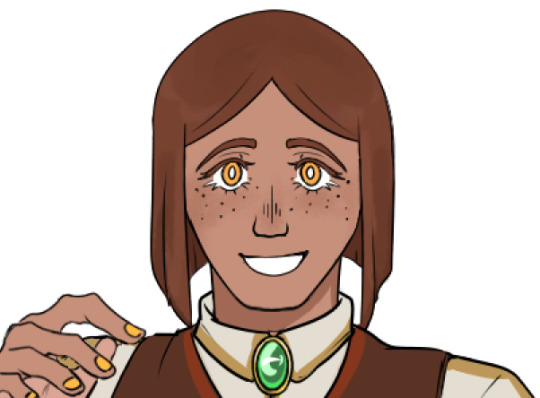
He is a favorite but sadly doesnt reach blorbo status as lily and hero but he's up there
30 in present time, demi sexual and romantic, doesnt know he has ptsd, isolated himself for over 5 years lol
Born as a grand mage (i cant find my source talking about this so uh, basically mages here are born with 1 skill type but grand mages can learn any skill type thats all you need to know (and theyre rare)) and a branch of the Artesia Family (rant here lol). Oliver's mother always wanted a daughter and so she would dress Oliver as one, enrolled him in school as such, and prevented him from trying to question her authority or pretty much do anything himself. She was abusive and held him to high standards. This led to a lot of bullying and being unable to make any friends.
This got him to be taken into the custody of his uncle, but once he hit 18, he was enrolled into the military (war just started) as a frontline medic. He absolutely hated this job and found it pointless to save someone who will only go back out to battle. He ended up committing War Crimes by lvling a field with foe and allies, tried to cause war disruption on his own, then let himself be caught so he could be bewitched (also cant find where i talked about this but basically, their magic is nerfed and theyre unable to physically lie), he ranaway soon after and lived alone for over 5 years in a refugee village, becoming the village doctor, herbalist, and pharmacist (he isnt licensed but he knows what he's doing)
He starts off selfish, blunt in adding unnecessary details/comments, has a really cheerful and upbeat energy to him but he will say the most vile bitchy thing ever, over confident in himself, smaaallllll power complex, comforting in his gender (being male) but will roast your ass if you call him she/her (Intentionally)
TOYHOUSE he is also one you can find a lot on my tumblr if you just search up his name on my blog
3. Jonah Artesia

the fucking baby boy, protect him with all your life
around 16 in the present, queer, god someone help this kid he is drowning in anxiety, low self esteem, and separation anxiety that makes him feel like he needs to be useful
Jonah was born into a Mage Family but was given the short end of the stick by being born a Dark Mage (a magic type that is feared and pretty much banned from these mages to practice at ALL), he was abandonded when this was discovered (around the age range 10-12). Trying to live a decent life, he found himself attempting to be useful via being a guide. He makes maps and sells them, he can read the stars and find his way out of most forests and places. He was finally taken in by a group of teenagers that needed a guide, in which he fit in perfectly. He tends to keep quiet and never voices his opinions, doing anything to be a ppl pleaser in hopes they'll let him stay, which they do after they find out he's a Dark Mage.
in the future, he ends up being adopted by Lily and Oliver, growing in a healthier steady environment where they try to help him recover and grow as a well adjusted adult
he's a big doormat, way too kind and caring and way too selfless, will never speak up for himself, he just doesnt wanna be left alone again and will give up as much of himself as it takes to :(
TOYHOUSE uhh you can find some lore on him but a few of it can be dated
4. Alexander (i dont have a last name yet sobbing)

he's recently been rising in my mind lately, he is the local WHORE
currently 32, his sexuality is anyone he can have sex with lol, he copes with sex, suffers from insomnia, he makes the absolutely worst dog shit decisions when it comes to his brother its astronomical how stupid he is and how much of a King manbaby he is with the way he approaches the situation.
The first son of the royal family and elder brother of Lily, he is currently King. He is the reason lily ranaway and blames himself for the rest of his life, aiming to make it right by all means. He is a good and caring leader that attempts to listen to his people. But he's very two faced in that he's actually super tired and bitter in the inside and would throw all this away if he could. He hates his job, he hates his life, he's miserable but never lets himself show it nor change how well he does his job. Due to his first lover having been someone who only used him to steal money from him, this man has never fallen in love since. The only intimate relationship he'd have with anyone is through sex but even than its under a disguise. He has no friends, he hates other royalty and nobles, but he will never lash this out on people. The kingdom loves him and he puts on a serene and comforting smile for them to stay trustworthy and complacent.
he's very Fake nice and flirty, he tries to look under the true intentions of anyone who attempts to have a relationship with him. Hardly trusts nor listents to anyone, he's actually pretty awkward when he isn't being King or doing official business, he just really does love sex
tOYHOUSE you probably wont find anything much on him on my tumblr except from pretty dated things i probably scrapped and are no longer canon lol
5. Valdis Nevermore

this is an image of him in the future but i dont have any of the present. i would say hes a himbo but hes problematic
31, bi, hes got a hero complex, turns from occasional drinker to alcoholic real quick after certain events, complicated family relationship
Valdis is born from a family of knights, and being the eldest, he follows in the footsteps of his father and his ancestors before. He knows there is a problem in the system, but he hopes to help change it from the inside, but finds himself following their orders more than questioning them. Despite this, he does have high morals especially when it comes to treating others and commoners. He attempts not to use his status as an advantage against others. However, once he is in charge of lily during lily's time in the military, he finds his passion reignited to question leadership and develops a hero complex towards Lily, feeling as if he has to help/save him but ends up making things far worse than they should. Once lily is assumed dead, valdis deserts as a Knight, gets disowned by his family, and is on a constant run from being tracked down. Lives with regret and drowns in alcohol
He is a very helpful guy, very kind to all, and a bit of a loser lol. Charming and charismatic when he's not wallowing in pity, he really does have a good heart that is misguided.
he has no toyhouse and very little information is avaliable on tumblr
6. Lenn (might change her name so ill just keep her nickname)

i have so little woman but GOD am i gay for her, she is wife
35, lesbian, she needs time off and doesnt deserve the treatment she gets fr, get a better job or beat alexander up
a half dragon half human that was "adopted" into the royal family. It was more like taking her in when she was a child, raised as their older sister, but eventually assigned herself the role as the royal guard to the brothers once their parents passed away. She has dedicated her life in trying to protect the remaining family she has, yet it seems alexander hasn't seen her as such in a long time. He hardly listens to her advice and attempts to shoo her away with unnecessary tasks. but she wont let up, even if they no longer see her as family she will strive to protect this family from ending itself even if her worth is no longer appreciated
when around alexander she is serious, stern, and straightforward. Yet in a casual setting, she's rather quiet and wants nothing more than have a moment to relax, yet her mind can't seem to let her. It's been long since she's ever been in a relaxed setting away from the King, but she can get pretty bashful away from it all
she has no toyhouse and almost nothing on my tumblr LOL
two more before i let you choose if you wanna listen about another OC that i will just list and give even more basic information on or give yourself a mental break from the absolute OC brain i have
7. Sergio Cartias
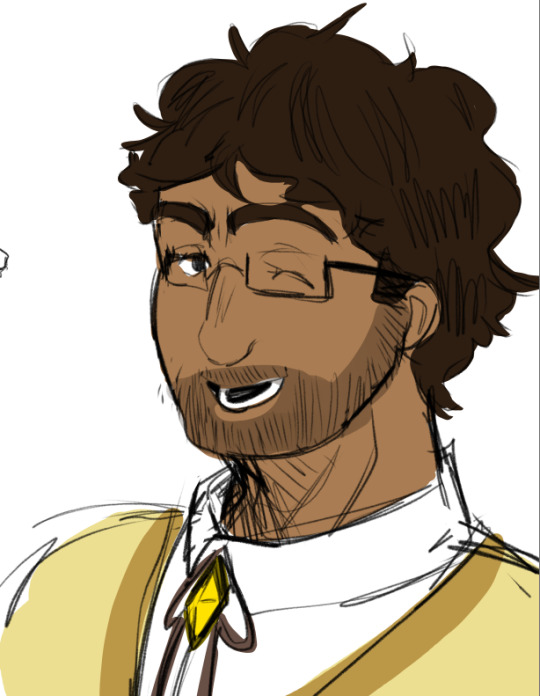
who brought their weed dad, for some reason i have so little of him yet he is SO loved
30, uhh, i forget what its called but he likes fem presenting people regardless of gender (but he is married to someone who uses she/her). honestly my most normal guy his biggest flaw is he smokes lol.
born from a mage family (listen..i did not realize how many of my ocs come from important Line families istg this was unintentional but when put together it does not seem that way) this branch specalizes in information and history, making him following in the line and steps of becoming a professor/teacher, specifically on witches. while the job was accepted by his family, the specifications and how he teaches about witches is not. The reason being he was Oliver's only friend that really sympathized with his situation and figured bewitching a mage doesn't exactly mean they're horrible people, because he couldnt believe some of the vile shit they would say about Oliver. He lived a fairly normal life with his spouse and being a pretty great teacher that students grew to love.
He's very laid back, he really is Just A Guy but in a good way and has the least drama carrying. He sees his own family above all, but he will be there for his friends or anyone who needs him or just someone who wants to talk to someone. Oh and he's a lightning mage and knows how to use magic with just his hands! (this is relevent?? sorta?? in my lore using your hands for magic casting is the ultimate control sign, as most mages use wands or other mediums given they have easier control with them than hands which is harder to master)
he doesnt have a toyhouse either and you can find some bare minimum stuff on tumblr
the next character is from an entirely separate universe/story, as everyone above is part of the same one.
8. Hero

foaming at the mouth and rolling around the dirt he is THE blorbo right now omfg I CANNOT stop thinking about this absolute piece of shit person he is my WORST character i fucking love him rn
228 years old baby, aro/ace with extreme sex repulsion and generally physical touch repulsion, god he is so fucked up there is so much wrong with him, might have autism but unrelated to him being an asshole he just isn't neurotypical aint no fucking way (this was done unintentionally btw but certain parts of him made me realize oh, typicals do not feel or think this way usually)
Born half human/half druid, he was left abandonded in a village filled with mixed species. He never knew his parents and he was never given a name. the village he lived in was raided by knights and many kids, including himself, were captured. After captured, he went through what is known as the Hero Project, in which they aimed to find and raise the most suitable to be the kingdom's official "hero". Hero, being the most human passing, was given an advantage already. When tests were conducted, he passed with desired results (praised/rewarded for following orders unquestioningly, least hesitant to harm others) It is no surprise he was the winning candidate to be Hero. Throughout, he was still never given a name but instead called by his title once he earned it. their biggest gripe with Hero was his personality, but through time, he learned to mask his true personality and instead showed one of heroism and kindness. All his expressions were calculated depending on who he was speaking to and especially in public. However, outside of the public eye, he was a nightmare to work with
He cared for no one, he is pure selfishness, he will strike down anyone in his way and in fact enjoys killing to an addictive degree. All crimes he's ever committed were swept under the rug in order to keep his image clean, and so he knew he could get away with anything he pleased. He will torment you in any way that will gratify him and worsen you, be it physical or mental torture. He thrives on seeing the expressions of despair and betrayal. He betrays his kingdom and party members at the drop of a hat because he was simply bored. He betrayed the only person that he somewhat cared for because he refused to change, continuing a campaign of destruction as he used his status as Hero to confuse those who haven't heard the news of his betrayal.
He's cynical, calculating, and will do anything to let himself stay in control of his life
TOYHOUSE there is also so much more lore on toyhouse but ive dropped quite a bit on my tumblr recently
Time for speed rundowns:
Peter/Petros/Petra: The leader of golems that will do all in their power to ensure they thrive. the oldest golem that has little hope for humans, but isn't stubborn enough to put their people in jeopardy over them
Jairo Torrance: A farmer that is currently the closest to a friend Oliver has. He is generally nice but dislikes Lily given he was there when lily temporarily ruled the kingdom
Diene Artesia: the eldest daughter of the artesia family and the next in line as head of the family, she is a lesbian disaster and monster fucker
Azazel: a golem that is half sheep/human, he is mute and the 2nd oldest golem, but he keeps his whimsy and cares for Ophiuchus
Ophiuchus: a golem that follows azazel around, he helps communicate to others what azazel attempts to say and keeps him company and protection
-
Caide/Mushi: a demon working under a prince of hell, he had forgotten his purpose on the surface before coming to his senses and continuing the plan they had set in motion
Dylan: a half demon/human who was named "Demon Lord" by humans despite being far from it, he wishes to leave in peace but when push came to shove, he will do what must be done
#ocs#original characters#hooooo boy gl anyone#lily#oliver#alexander#alex#ollie#valdis#val#jairo#hero#lenn#sergio#jonah
5 notes
·
View notes
Note
😲📸 can i ask for a aleksi and maya first time interaction? it'd be so complex to they meet to me
Here's a gift to my followers, especially those that crave badass women vibes
alexandra and maya sakamaki: the beginning of the end of the beginning




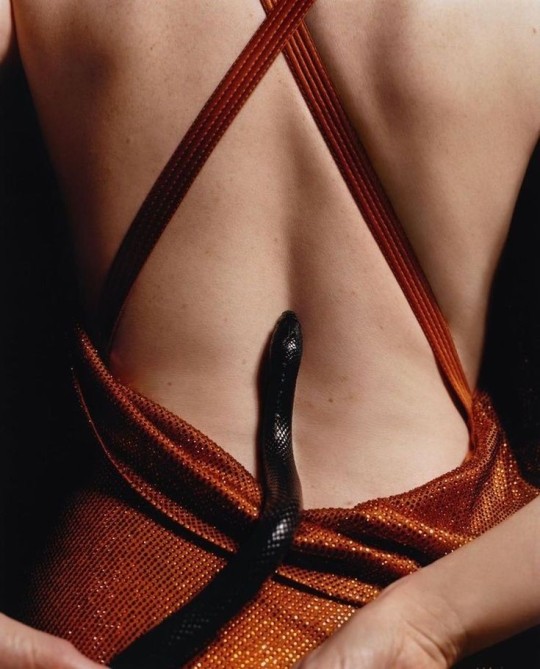


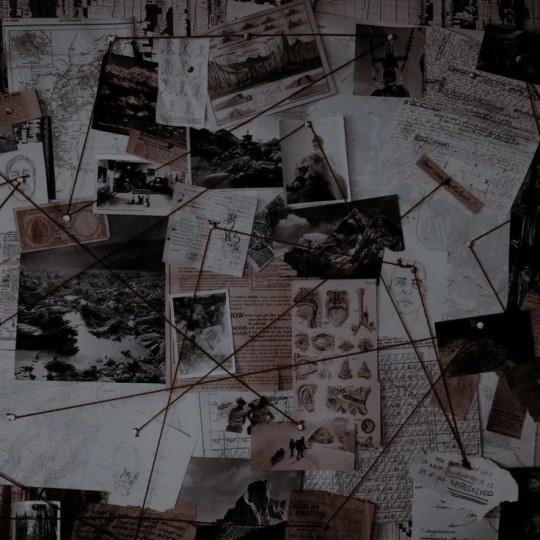


Hmm if I'm being honest, Aleksi and Maya's relationship kind of mirrors Loid and Yor's dynamic from Spy x Family (just make it platonic big sis-lil sis friendship and imagine them working together)
It's like spy x assassin combo right there
So yeah as mentioned from @besnella 's post of how Aleksi first saw Yui, it was also the same time Aleksi met Maya and guuurl the height difference between them is so large, Aleksi looks like her big sis (I want a big sis omg)
Just imagine Aleksi's 185 cm height vs Maya's 145 one. Go figure.
Aleksi thought "ah this girl's cute" cause Maya has this Japanese standard look on her, ya know long coal hair, sharp doll eyes, pale skin, the works (she actually reminds Aleksi of those Japanese kokeshi dolls, ya know it's like Japanese matryoshkas)
On the other hand, the only thing that comes to Maya's mind when she saw Aleksi was "fire" and "power" (Alexa, play Girl on Fire)
Aleksi heard of Maya being a former human who turned into an incomplete vampire bcos of a blood transfusion spell, then was later on sired by one of the Sakamaki's and married her to seal the deal.
Yeah, as if Karlheinz wreaking havoc in the demon and human world is not enough, he had to make his spawn man child (this is Kanato but let's pretend we don't know him) wed the poor doll.
So one time Aleksi was becoming the queen of the night, enjoying the party to bliss when she nearly had her fall and someone was pouring wine.
Good thing, Maya managed to save her, catching her by the arm before matters got worse.
And yes, some obnoxious gaslighting vampire noble became the victim of that pouring wine but we don't care abt them cause they just think of us humans as blood bags anyway
That was just the beginning.
One day, Aleksi was assigned on a mission, but not just a mission where she kills and retrieves info then go.
The thing is, she can never be caught. Like she had to make it seem like the vampire drug den and all the people did not exist. And even though it's relatively easy, Aleksi cannot move hastily.
Because one, the den was located in the human world and the person behind it was some famous personality sht. It's like Karlheinz being Togou Sakamaki in that world.
Pft. Fucking asshole
But she was just informed that someone is backing her up from the shadows so she just needs to do her usual work.
So yeah the mission went smoothly. Aleksi murdered the mastermind, got the files she needed from their inventory room, etc. She was about to leave the damn place when she heard a man scream from the hallway.
The next thing, the fvcking sht was crawling his way towards her.
Aleksi made a stance, readying her gun to end his poor fate when the man suddenly stopped in his tracks then died, blood spilling from his mouth.
After a few minutes, Aleksi saw Maya enter the room casually, unscathed like nothing happened while holding her silver bow and arrow.
Maya bowed to her in respect.
"Thank you for your work, miss. I will handle the rest."
Aleksi didn't expect that but oh well
And the next thing, Maya summoned all her skeleton familiars from the demon world to fix the mess in the den. Like the den has to be freaking empty, to a point that no one had been there.
"Have you been doing this for a long time now?"
Maya nodded. "It's quite hard to clean blood once it has dried up so I've been fixing things before they get quite difficult."
And that's how they bonded. Turns out, Aleksi will prob have missions involving Maya since the vampire doll is tasked to ensure no mythical beings (esp vampires) are causing havoc in the human world.
Aleksi "So do you just cover up their mess or you kill them?"
Maya "Depends. Most of the time, I just kill them in the dream world so they would die of natural causes."
It was purely a strict business relationship between the two... until Aleksi started sending her snake familiars to Maya so they can bond over other things like shopping, spa, salon etc
Like there was one time Maya was serving snacks to the Sakamaki bros when a small snake appeared and wrapped itself around her hands
I swear Ayato freaked out and thought their family doll has a secret pet snake. Even Reiji was so ready for his lecture when Maya just casually told them
"It's a snake familiar sent by a business partner."
But yeah Aleksi taught Maya things like dressing up for the mission, what kind of makeup she should put on during disguise. Even taught her how to wear a wig properly so Maya won't have to deal with tons of hairstyle accessories just to make her hair different for every mission
"Just dye your hair, Maya-chan! I bet you'll look pretty in blonde."
"... I still don't want to."
Sometimes they would bond during training sessions, especially when Maya wants to vent out abt the Sakamaki bros, like when they screw up somewhere and want her to clean up their mess.
"I swear I will kill Ayato-san if he weren't my husband's older brother." 💀💀💀
But yeah overall they trust each other completely with their life, and it's evident by how they watch each other's back during missions.
If Aleksi was the one fighting the battles, Maya will work in the shadows to ensure no one gets in her way.
#alexandra natalya fyodorovna#aleksi and maya#aleksi#maya sakamaki#sakamaki maya#maya#dl oc#diabolik lovers oc aesthetic#diabolik lovers lc#diabolik lovers headcanons#diabolik lovers oc#diabolik boys#karlheinz#kanato sakamaki#ayato sakamaki#reiji sakamaki#komori yui#diahell#kanato x maya#diabolik lovers#kanato x oc#kanato and maya#badass#girl boss#oc aesthetic#diabolik lovers aesthetic
30 notes
·
View notes
Text
Trigger Zones and Parallax Hell
If only you knew the pain I've been going through with cameras in Game Maker Studio for the past few weeks! But it's fine, I've got it all figured out now. This post is going to be a pretty long one. To be honest, there are a lot of little things I've done since the last post that I'm just going to either gloss over or save for a different post (maybe?) Primarily trying to standardize my code, resizing my sprites again, and hitbox thingzzz.
Anyways let's get into CAMERAS!
So game cameras were a little bit of an enigma for me going into this. From application surfaces to resolution, to window size... Quite frankly, they're very powerful tools when it comes to building a game, and all the stuff you can control with GameMaker's camera was frankly-
a massive headache.
Come down the rabbit hole with me-
TRIGGER ZONES
First things first, I had to get the camera set up. There are a lot of tutorials on this, all of which are slightly different. My code ended up somewhere in the middle of all of them. Here was the first tutorial I followed:
How to make a Camera for any GameMaker game in 4 minutes
by Shaun Spalding
So Shaun Spaulding's video helped me get the camera set up in the first place, although frankly, this method didn't last very long in my project. It was good and simple but for whatever reason, people really don't recommend you use GameMaker Studio's Room Builder's camera settings, but rather code them yourself. I'm not sure why else other than the fact you get a lot more control over your game's in-game camera, resolution, and window size, plus you can create cutscenes and stuff with it. Next was-
Smooth Camera Tutorial + Pan/Zoom [GameMaker Studio 2]
by Matharoo
Matharoo's code was more complicated at first but it gives you that level of control that I was just talking about, and it sets it up in mostly the same way. Although, my code now is definitely a mash-up of the two tutorials.
With those two tutorials, now our camera looks like this:
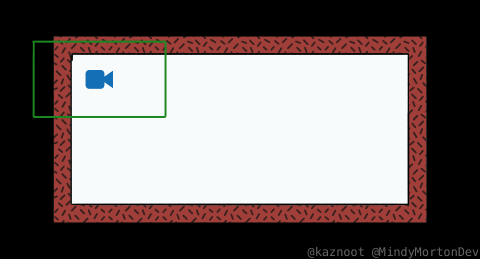
This is great! Now we have an actual camera instead of looking at the whole room! But if we look at our camera's view, we can see that the camera is seeing out of bounds. Matharoo's video may have actually covered this (you can watch it yourself) but where I found my solution was-
Camera Modes | GameMaker Studio 2
by FriendlyCosmonaut (this one starts at 14:33)
I did not watch this entire video but it looks like it has a lot of useful information in it. Even though she isn't making the same type of game in the video, she does cover the topic I needed, which the provided link will actually jump straight to that section of the video

This is solid! Now that we have one problem solved, it's time for another-
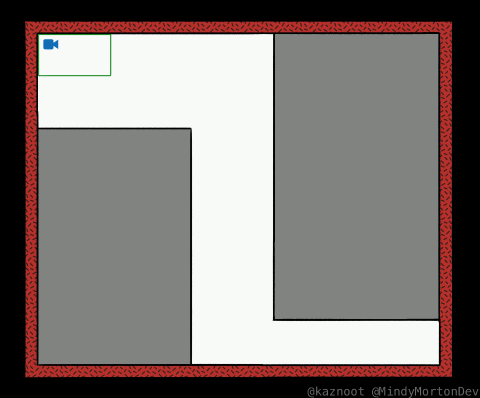
Unless you're going for something more old-school like Super Metroid, we're likely going to have big open rooms that twist in multiple directions. I had a pretty clear vision of how I wanted the camera to operate. My trajectory is in the direction of Hollow Knight, which has a simple yet complex camera system that is very well explained in this YouTube video:
youtube
This video sort of became my "mission statement" with all this. Unfortunately, I don't have a tutorial I can point to for how I coded all the stuff in this video, but I did realize Shaun Spalding briefly touched on his own solution to this kind of problem with what he called "trigger zones". This is a good way to describe my own solution. Essentially we're going to create an array of overlay objects, or "trigger zones" that will restrict the camera's movement to only being able to move where they say. This is more or less the setup we're looking at:
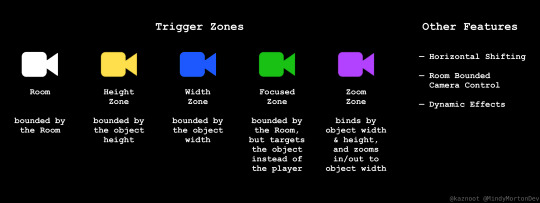
This is how Hollow Knight's cameras appear to be working in the video, and how we'll set them up too. I won't dive too deep into the nitty-gritty coding on this one, but basically, each of these trigger zones is an object in GameMaker that will bind the camera by their respective dimensions.
This gets very inter-relational with all these objects since each object needs to be able to apply its own unique dimensions to the camera boundaries. It did become a little bit of a headache managing what turned into 5 or 6 different camera-related objects which were all modifying each other.
Here are some pictures of how this looks in practice. Keep in mind that these would all be turned on at once to function properly:
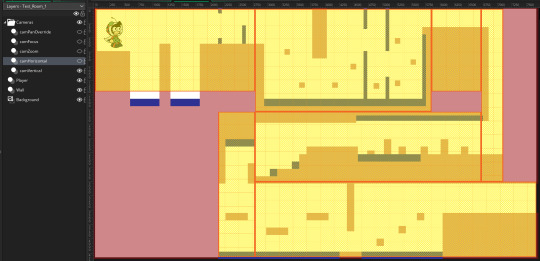
Vertical Trigger Zones
(the camera won't move above or below the zone the player is in)

Horizontal Trigger Zones
(the camera won't move too far left or right in these zones)

Zoom-In (or Zoom-Out) Zone
(the camera will zoom in/out as far/close as the width of this zone)
These are just a few examples but hopefully, the concept makes some sense to you! So finally, with these systems in place, our cameras will finally move like this:
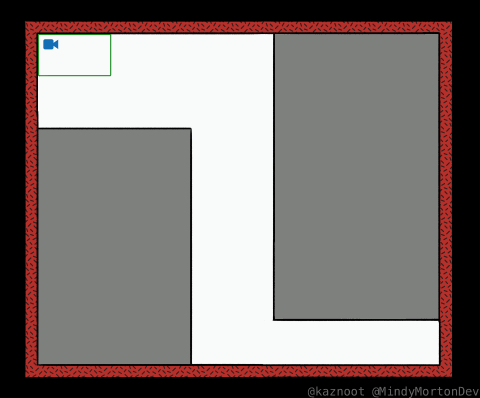
And that is (mostly) the end of that. Scope creep has kept me coming back and adding incremental changes to all these features (specifically the zoom one). Fundamentally they will continue to work the same but it's easy to keep tuning things like camera speed and zoom speed.
Anyways, with this stuff done it's time to get to the next thing:
PARALLAX HELL
So the actual solution to this was straightforward--use a 3D camera and follow this tutorial:
From 2D to 2.5D: GameMaker Studio 2 TUTORIAL (Using 3D Camera) | Easy Parallax
by Matharoo
It's what Hallow Knight does, it creates a natural parallax effect, and it makes a lot of the artistic work pretty easy. But, the reason it took me so long to get here is a story that brings me great pain...
To start, I wasn't originally going to use a 3D camera because they sounded somewhat complicated. Even Shaun Spaulding sounded like he didn't recommend them in his tutorial that I shared above (although maybe that's just for beginners). What I was going to do could be called "interpolated parallax," where we are basically moving a bunch of image layers around relative to the position of the camera.
You can learn more about this in this video by Pixelated Pope.
That doesn't really need to make sense to you, but that's what I was doing. Now, this method could have totally worked theoretically if it weren't for the fact that GameMaker Studio 2 has actually removed certain coding properties from GameMaker 1.4, which makes this method kinda unreasonably difficult? At least from what I tested. It works great if your only intention is to have an endless runner game or if you want to accommodate for open space by drawing individual sections of background together in a giant 4k+ canvas.
It sounded messy and I didn't really want to deal with it. Eventually, I learned more and more about GameMaker Studio's 3D camera, which was easy to set up for my specific needs.
It did take a while to fine-tune it all but I did get there in the end. It did, however, break my zooming trigger zone. This post is already long enough but basically, I thought the solution would be needing to change the camera's field of view with trigonometry when it was actually just changing the camera's distance with a basic ratio...
Not my brightest moment there and it took a painful couple of hours of staring at the same code and Desmos to figure that out.
ANYWAYS...
The camera system is finished! Or at least, finished enough that I can move on to designing backgrounds, and just fine-tune this bit by bit later down the line.
Honestly, this was all very time-consuming, and the struggles with the zooming trigger zone were a bit demoralizing, so I'm ready to get back into the art generation side of things!
I also plan to spend some time beating Hallow Knight and maybe a few other platformers I can take reference from for backgrounds 😎
See you next time, everyone!
#gamedev#hollow knight#original character#coding problems#indiegamedev#parallax#hell#actually hell#gamemaker studio 2#art student
8 notes
·
View notes
Text
EROI, or energy return on investment, the energy recovered from one unit of energy invested in obtaining it, continues to decline. EROI, in a sense, is the most important index of the quality of a deposit. It integrates the two main countervailing forces operating over time that effect the efficiency of winning energy from nature: increases due to technological progress and decreases due to depletion. Since the EROI of most fossil fuels is decreasing, depletion is the dominant force.
The importance of a high EROI for the production of wealth can be seen clearly from the work conducted by Carey King. About half of the economic activity of England from about 1300 to 1750 was dedicated to generating the energy (food, fodder, wood) to run the other half of the economy, implying an EROI of something like 2:1 for the energy sector. Civilization certainly existed, and people may or may not have been basically happy, but they were certainly poor by today’s standards, with very constrained food options, generally short lifespans, little travel and little or no recreation as we understand it. This ratio held until the beginning of the industrial revolution (about 1750), when the EROI increased to perhaps 5:1 with coal and then 10:1 or more with oil. For the first time, many people became fairly well off. This relative affluence for many continues today, when we pay only about five percent of our GDP for energy (except when, in periodic “energy crises”, it goes up to and above 10 percent). Thus, for a modern civilization with education, health care, complex arts, etc., we do not need just a positive EROI but a substantially positive one, with an EROI of something like at least 10 or 12:1. One can imagine a modern society existing on an EROI of say 2:1, as England did in 1500, but in this society half of all economic activity would be dedicated to generating the fuels that would allow the other half to exist. Society could be as poor as England in 1700, and this ignores the fact that there are many more people to feed.
Many studies suggest that in the past few decades our best oil and gas fields and coal mines are increasingly depleted, and the EROI for all fuels has been decreasing. Laherrere believes that our current “official” estimates of oil remaining are several times too high since they are inflated with “ghost” amounts that are politically but not geologically derived, include large amounts of ultra-heavy “tar sands” and use inappropriate accounting procedures. Such assessments give support for Mohr’s “low” estimates and the decline in resource availability in the original Limits to Growth.
8 notes
·
View notes
Text
I am not someone who won't be there for their friends because I "can't handle negativity" or anything like that. Especially not after all of the trauma and abuse I've had inflicted on me throughout the entirety of my life.
I'm a fairly resilient Human Being who, I think at least, has learned to weather quite a lot of difficulty of various types ... Maybe not perfectly- maybe certainly not with Grace. And sometimes definitely with panicked tantrum throwing and hissy fits. And yeah, admittedly it has gotten harder and harder, as I've aged, not to become overly stressed about things and give into anxiety and agoraphobia every time something new goes wrong in my life yet again... But I still always get through it in the end, with force.
I like being there for my friends. I enjoy helping people. Service is my love language. I am a nurturing and compassionate person by nature, even if I struggle with certain aspects of Emotional Empathy because of my conditions; I will literally give people the shirt off my back and the food out of my fridge if I can- and I have so many times over, even when it wasn't appreciated ... It is the right thing to do, and the right kind of person to be, and it's something I take immense pride in being and refuse to accept being told I'm wrong or naïve for.
Not to mention that's just how friendships are supposed to work in the first place; part of being a friend is literally being there to support them in times of need. To listen to them. To offer condolences. To be a source of warmth and stability. To provide aid and mutual support. That is literally part of the foundation of human commitment, compassion, and connectivity. Without any of that, you don't really have a real friendship ... You have an acquaintance at best.
That being said: I no longer tolerate friendships based on constant pettiness, misery, bitching, and negativity; friendships where the only time someone deigns to talk to me (no matter how frequently) are times they have some new complaint in their life to bitch about, or a burning desire to be petty about something new- where any positives are few and far between. Especially when many of the issues are of their own making, or aren't worth getting worked up over, or are unnecessarily obsessed over to unhealthy levels.
I also no longer accept friendships where it feels like I'm being squeezed for everything they can get from me, without any appreciation for it or what it takes to give it in the first place; friendships where the only time someone deigns to talk to me (no matter how frequently) are times they need or want something- advice, aid, money, etc- but they don't actually appreciate or even use anything that I give them in good faith.
Likewise, I no longer accept friendships where I am, essentially, nothing more than a Walking Encyclopedia valued only for the knowledge I carry; friendships where the only time someone deigns to talk to me (no matter how frequently) are times they want some piece of knowledge they think I can likely provide them.
I also no longer accept friendships where they are completely disinterested in what is going on with me; where I am essentially never allowed to talk about myself and my own life, and any and all attempts to actually talk about what's going on with me are always shut down, ignored, or backtracked right back around to them and what they're going through in one way or another.
Friendships where I am not a person at all ... I am something else entirely; something they can use to some ends, or for some means, rather than recognize the inherent Humanity of (no matter how much they pretended to do so- or if they did legitimately do so at some minor points in time).
Once I stopped accepting those types of friendships in my life, it became blatantly clear exactly how few friends I actually had; how few people actually valued and respected me as a complex, multifaceted Human Being. And it sucks trying to make new friends with these standards in place, now, because it clearly shows who does- and doesn't- acknowledge your Humanity very early in the attempted relationship (near immediately) ... But I'd much rather have them in place than not, and continue to be used like I was being.
Because those weren't friendships. And I'd only spent decades lying to myself in order to convince myself that I wasn't completely miserable in them, dealing with those behaviors from people; always feeling inferior to everyone around me, and used by them for various purposes; constantly being stressed out by other people's issues, and never getting a break from anything- always having to solve everyone else's problems, or, at the very least, always being forced to listen to them because that's all they ever wanted to talk about with me; constantly having my boundaries walked over and my mental health disrespected by people who claimed to care about me (but never actually feeling cared for).
I'd rather have one friend who actually acknowledges my Humanity and treats me as an equal, than still be stuck with 10 friends who don't and never once made me feel like they did.
1 note
·
View note
Text
Can I stay inside your head?
Tw///
Domestic and child Abuse
Murder
Repeating words in the first paragraph.
Dedicated to @xxeither-nanoemikoxx and @poetonthemoon who asked for this <3
Dream killed Schlatt. Dream killed him Dream killed him Dream killed him Dream killed him Dream killed him Dream killed him Dream killed him Dream killed him Dream killed him Dream killed him Dream killed him Dream killed him Dream killed him Dream killed him Dream killed him Dream killed him.
Dream killed Schlatt.
Quackity repeated the words over and over and over until they where bruised into his head. He hadn’t even know what his breaking point was until he found it. It was Tubbo bursting into his room, a dark ugly bruise under his eye. Quackity hadn’t even noticed he was crying until the tears stained his button down. Tubbo had learned to cry without making a noise.
The thing was Quackity could handle Schlatt. He was a grown ass adult and he and Schlatt where complex. He didn’t really care what Schlatt did to him. That was lie. He cared. Quackity had always cared far too much. Schlatt was right when he said it was a weakness and Quackity sliced his soft bits off. He was still bleeding but whatever he would live.
It was funny how low his standards had gotten. Quackity lived sunrise to sunset, every morning hoping to make to the next one without harsh words or the smell of vomit or a broken bone or a country blown to kingdom come.
Everyday Quackity prayed not to lose more of himself or lose something he couldn’t replace. And then Tubbo lost something instead. A kind of childlike innocence replaced with swelling skin. Quackity’s heart stoped beating for a second before he warped the child in his arms. His pain shattered into cold anger. Because Schlatt wasn’t allowed to ruin Tubbo too. He messaged Dream with an offer he couldn’t refuse and in return got a dagger. Black and totally untraceable. It glowed with green symbols that became ones and zeros in lines over the blade.
Dream killed Schlatt. It was Dreams dagger that went into his gut. It was Quackity who lay awake in bed watching him sleep. It was Quackity who waited and waited until it was almost too late, hoping to feel guilty or triumphant or anything other then empty. He couldn’t.
It was storming that night. The thunder hid Schlatt’s screams. Quackity stuck down again and again until his arms where red. Quackity didn’t know when he finally stoped only that the sky was lighter. It could have been a few minutes or several hours. He was crying without making a sound just like tubbo because that was survival skill in Manberg. The sheets where soaked in blood. Quackity wanted to feel guilty. He didn’t. This hadn’t fixed his broken bones or the bruises on his face hidden by makeup, it wouldn’t give Tubbo his smile back. It wouldn’t fix them. But just like Quackity couldn’t feel happy he couldn’t feel bad. He just felt empty.
At an unknown time during the night Dream had killed Schlatt with a dagger only available to admins. That’s what Quackity told the rest of the cabinet. That’s what Quackity, a widow at nineteen, told the press bravely holding back tears in front of the cameras.
It was a tragedy Quackity told Tubbo putting makeup over his bruises for the last fucking time. They were all very sad and shocked he told the press, Schlatt’s blood still on his skin hidden by his suit jacket as he forced a single tear down his cheek.
Dream had killed Schlatt, he told Tubbo and Fundy as they helped him wipe blood off his face. And Dream had done them fucking favor because they where finally free.
#welp that’s it hope you enjoyed!#bouns points if you guess what song this is based on#c!quackity#c!tubbo#c!cabnit duo#c!cabinetduo#c!pumpkinduo#c!schlatt#c!schlatt neg#lady writes
14 notes
·
View notes
Note
You mentioned Void loving Christmas/Gyftmas, so maybe you can talk about why he loves it? And how some of your other boys feel about it/what they're up to during it?
I thought I answered this, but I found the response in my notes the other day, unposted, n I am only remembering just now to actually. Answer it!! I’m so sorry I have. No idea why I didn’t answer it before this ask is like a year old 😭 anyway
I would be absolutely happy to!
There’s actually a few different versions of VF, but for this one, I’ll go with the version where VF winds up on a merged surface with the other main AUs.
Regardless of variant, it’s a standard headcanon of mine that Underfell doesn’t have Gyftmas. It’s not until they surface, or meet others from Tale type ‘verses, that they learn about it/Christmas.
Suffice to say, it’s a…bit of a hard sell at first. It’s a complex thing that basically encompasses two or more months of the year, especially on the surface with all the other holidays coming into play. Tons of traditions and elements, stories and activities, easily a bit overwhelming to just sort of…step into, after a lifetime without even the concept. But once the others know, well, that they don’t, they, Rus and Blue especially, take it upon themselves to educate them!
In this variant, before Void had a lot of (or really any) experience traveling the multiverse, the others knew him as Edge, and he…wasn’t as open minded or laid back as he would become in the future. He’d rejected the idea of Gyftmas initially, believing it to be childish and useless, but still, the others were his friends, and he eased into humoring them without too much fuss.
Of course, as time went on, it became less humoring and more curiosity, less exasperated and more relaxed. The concept was frivolous, maybe, but the way the multicolored lights reflected off the still, clean white snow of a Tale verse was…beautiful. And slowly, it snuck it’s way into his heart. How much the others enjoyed it, how they were so determined to adopt the Fells into their ridiculous, meaningless…pleasant……heartfelt traditions.
It didn’t take too long, especially surfaced, for Void to concede. He loves the snow and the cooler weather, loves the lights and decorations. Loves celebrating with his family. Being able to keep them warm and fed, being able to find or make gifts for the people in his life.
It’s…everything their underground wasn’t. A celebration of kindness, togetherness, peace. And it grows into becoming his favorite time of year.
The concepts on top of the years of memory making to ensue, it becomes something deeply important to him. It’s something he believes everyone should have the chance to experience, not even the holiday specifically, but the feelings. The love. The safety and contentment. There are so many timelines out there like his used to be, so many who are still strangers to such things. He wants to change that. It’s why he does what he does, after all, traveling the multiverse to help timelines in need.
Honing it back in to Gyftmas/Christmas again, it’s just something that will always be important to him, and he always gets excited for it - since it’s important to everyone else, too, it means it’s pretty assured that their entire motley crew will be making time to spend together, and even as chaotic as that can be, he loves it.
As for other boys, I’ll stick w/ the main ones on the surface for now but if anyone has anybody specific in mind, I’d be happy to talk about others, too!
The Tale Bros - Rus, unsurprisingly, loves Gyftmas, he loves gift shopping, gift giving, gift getting, decorating, decorating other peoples’ houses, decorating random trees or shrubs around the neighborhood, watching holiday movies (Die Hard is not a Christmas movie but he’s happy to watch it anyway). He loves to bake with Tori, Void, and Blue (he’s usually happiest to be on the decorating committee), and he always finds new places to put mistletoe where everyone least expects >=o)c Sans. Is vibing. He’s not much of a gift shopper himself, but he’s weirdly good at gift advice, even if he himself almost always sticks to gag gifts. He actually likes playing babysitter to the kids, keeping an eye on them while they play in the snow and making sure they don’t stay out too long. He’s less about participating in activities and more about just enjoying the vibes, be it chillin on movie nights or hanging out at Grillby’s, it’s a good time of year to just relax and soak up everyone else’s holiday cheer (and playing a harmless prank or two).
The Swap Bros - Blue is a fan of Gyftmas in as much as he’s a fan of any celebration really! He loves planning parties and hang outs, he loves spending time with his friends and family, and there’s no better time to do all of that than during the holiday season! He always makes a point to visit all of his friends and give just about everyone he knows at least a small gift, he’s a social guy, and takes advantage of the holidays to really go all out. He and Void are a team not to be trifled with when it comes to planning and hosting all sorts of activities before the years end. Stretch might try to play it cool, but he loves Gyftmas a lot more than he’d openly admit. He loves all the lights and decorations, he loves the music and excitement, he loves being “dragged along” in to all the winter wonderland chicanery, and despite usually getting a dose of Seasonal Depression, the holidays definitely help draw him out of it. He’s content to stay on the sidelines most of the time, but he’s actually a pretty good ice skater, and he’s always happy to lend a hand decorating the baked goods (his gingerbread houses always look atrocious but he’s having fun and that’s what matters <3).
The VF Bros - We’ve mostly addressed Void, but he really. Really gets into it. It might be hard for a stranger to see from the outside, but pretty much everyone who actually knows him knows how into it he gets (especially with how he and Blue are constantly scheming up more things for everyone to do together, more events the embassy could host). He doesn’t go super over the top with decorating or anything either, it’s more so in just how he gets, always intent on finding or making excellent gifts for everyone, gifting food and baked goods to just about everyone he knows and making sure to keep track of preferences/allergies/etc, finding or making time to spend lots of time with everyone/helping anyone put up lights/watch others’ kids/really just. Participate in things as much as possible. (And always making sure everyone is dressed for the weather!) This even extends to closer friends he has from multiverse travels, even if it’s not that time of year wherever they live, they can expect to see baked goods and gifts or be invited to come participate in his ‘verse. Perp/Red. Is just vibing. Honestly, at first, he could’ve taken or left all this stuff, mostly just humoring the others, but…well, the more Void got into it, especially on the surface, the more Red started to actually. Care. Yeah, maybe it is a little saccharine and over the top (and a capitalist cash cow to boot), but…it makes his brother happy. And…he’d be lying if he said that was the only reason he likes it. The lights are nice and he’s never gunna turn down a free meal (or the good company that comes along with it). It’s a Wonderful Life made him cry the first time he saw it.
#not me having a cringe fail moment on main ✌️😔#anyway Void my beloved x204914#all of them my beloved honestly#sun spots#vf void#vesselfell papyrus#vesselfell#undertale#papyrus#sans#underswap#vf perp#us stretch#us blue#ut rus#ut sans#okay so I edited this a bunch and now I think I know why I didn’t post it. it needed a lot of fixing ahshjdjdgk#rotiniremorse#rotini my beloved =o)#clear sky sunset
6 notes
·
View notes
Text
Innovations in Gaming Technology from Japan: A Look at the Latest Advancements

Japan has long been known for its contributions to the gaming industry, with a history that dates back to the 1970s. Over the years, Japanese gaming companies have continued to push the boundaries of technology, resulting in some of the most innovative and groundbreaking gaming experiences in the world. From advancements in graphics and gameplay mechanics to breakthroughs in gaming AI and virtual reality, Japan has remained at the forefront of gaming technology.
One of the most significant contributions that Japan has made to the gaming industry is the evolution of Japanese gaming consoles. Companies like Nintendo, Sony, and Sega have all introduced consoles that have revolutionized the gaming industry and set new standards for what is possible. These consoles have not only introduced new technologies but have also helped to shape the gaming industry as we know it today.
Key Takeaways
Japan has a long history of contributing to the gaming industry, with a focus on pushing the boundaries of technology.
Japanese gaming companies have made significant contributions to the evolution of gaming consoles, introducing new technologies and shaping the industry.
Advancements in graphics, gameplay mechanics, gaming AI, and virtual reality are just a few of the areas in which Japan has made significant breakthroughs.
Evolution of Japanese Gaming Consoles
Japan has been at the forefront of the gaming industry for decades, producing some of the most innovative and successful gaming consoles in history. The evolution of Japanese gaming consoles has been marked by a series of pioneering console technologies and handheld gaming innovations.
Pioneering Console Technologies
The first major console to emerge from Japan was the Nintendo Entertainment System (NES) in 1983. This 8-bit console was the first to feature a gamepad with a directional pad and two buttons, a design that has become the industry standard. The NES was also the first console to introduce a lockout chip, which prevented unlicensed games from being played on the system.
In 1994, Sony released the PlayStation, which was the first console to use CD-ROMs as its primary storage medium. This allowed for larger and more complex games, and the PlayStation quickly became one of the best-selling consoles of all time.
The Nintendo 64, released in 1996, was the first console to feature 3D graphics and a joystick as the primary controller. It also introduced the concept of four-player gaming, which has become a staple of console gaming.
Handheld Gaming Innovations
Japan has also been a pioneer in handheld gaming technology. The Game Boy, released by Nintendo in 1989, was the first successful handheld gaming device. It featured a monochrome display and was powered by four AA batteries, but it was still a breakthrough in portable gaming.
In 1998, Nintendo released the Game Boy Color, which added color to the display and allowed for backward compatibility with Game Boy games. This was followed by the Game Boy Advance in 2001, which featured a larger, higher-resolution screen and more powerful hardware.
Sony entered the handheld gaming market in 2004 with the release of the PlayStation Portable (PSP). The PSP featured a large, high-resolution screen and powerful hardware, and it was the first handheld device to allow for online gaming.
In conclusion, the evolution of Japanese gaming consoles has been marked by a series of pioneering console technologies and handheld gaming innovations. Japan continues to be a major player in the gaming industry, and it will be exciting to see what innovations they come up with next.
Advancements in Game Graphics and Aesthetics
In Japan, gaming technology has always been at the forefront of innovation. One area where Japan has made significant strides is in game graphics and aesthetics. This section will explore two major advancements in this field: 3D Graphics Enhancement and Anime-Inspired Visuals.
3D Graphics Enhancement
Japan has been at the forefront of 3D graphics for decades. The country has produced numerous games that have pushed the boundaries of what is possible with 3D graphics. One of the most significant advancements in this area is the use of real-time rendering technology.
Real-time rendering technology allows game developers to create highly detailed 3D graphics that are rendered in real-time. This means that the graphics are generated on the fly, rather than being pre-rendered. This technology has been used in many popular games, including Final Fantasy XV and Metal Gear Solid V: The Phantom Pain.
Anime-Inspired Visuals
Anime has been a major influence on Japanese gaming culture for decades. In recent years, game developers have started to incorporate anime-inspired visuals into their games. This has resulted in some truly stunning and unique game graphics.
One notable example of this is the game Persona 5. The game features a unique art style that is heavily influenced by anime. The game's graphics are a mix of 2D and 3D elements, which gives it a unique look and feel.
Another example is the game Ni no Kuni II: Revenant Kingdom. The game features a beautiful anime-inspired art style that is reminiscent of Studio Ghibli's films. The game's graphics are highly detailed, and the game world is filled with vibrant colors and stunning landscapes.
In conclusion, Japan has made significant advancements in game graphics and aesthetics. The use of real-time rendering technology and anime-inspired visuals has resulted in some truly stunning games. As technology continues to evolve, we can expect even more impressive graphics and aesthetics from Japanese game developers.
Innovative Gameplay Mechanics
In addition to their cutting-edge graphics and sound design, Japanese gaming companies have been at the forefront of developing innovative gameplay mechanics that enhance the player's experience. Two examples of this are gesture-based controls and augmented reality integration.
Gesture-Based Controls
Gesture-based controls allow players to interact with the game using physical movements, such as hand gestures or body motions. This technology has been implemented in a variety of games, from sports simulations to puzzle games. For example, in the game "Fruit Ninja," players use their fingers to slice virtual fruit, while in "Kinect Sports," players use their entire bodies to simulate sports like soccer and track and field.
Japanese gaming companies have taken gesture-based controls to the next level with the development of devices like the Nintendo Wii and the Sony PlayStation Move. These devices use motion sensors to track the player's movements and translate them into in-game actions. This technology has revolutionized the way players interact with games and has opened up new possibilities for game design.
Augmented Reality Integration
Augmented reality (AR) is another innovation in gaming technology that has been embraced by Japanese companies. AR technology allows players to overlay digital images on top of the real world, creating a unique and immersive gaming experience. For example, in the game "Pokemon Go," players use their smartphones to capture virtual creatures that appear in the real world.
Japanese gaming companies have taken AR integration to the next level with devices like the Nintendo 3DS and the Sony PlayStation Vita. These devices use cameras and motion sensors to create a 3D environment that interacts with the player's surroundings. This technology has opened up new possibilities for game design and has created a new level of immersion for players.
In conclusion, Japanese gaming companies have been at the forefront of developing innovative gameplay mechanics that enhance the player's experience. Gesture-based controls and augmented reality integration are just two examples of the many ways in which these companies are pushing the boundaries of what is possible in gaming.
Breakthroughs in Gaming AI
Japan has been at the forefront of gaming technology for decades, and recent years have seen a significant focus on developing artificial intelligence (AI) for games. This has led to many breakthroughs in gaming AI, which have greatly enhanced the gaming experience for players. In this section, we will explore two areas of innovation in gaming AI that have emerged from Japan.
Non-Player Character Behavior
One of the most significant breakthroughs in gaming AI is the development of more realistic and dynamic non-player character (NPC) behavior. NPCs are characters in a game controlled by the computer rather than the player, and they play a crucial role in creating a rich and immersive game world. In the past, NPCs were often static and predictable, with limited options for interaction with the player. However, recent advancements in AI have enabled game developers to create NPCs with more complex and varied behavior.
For example, some games now feature NPCs that can learn from the player's actions and adapt their behavior accordingly. This creates a more realistic and challenging gameplay experience, as the player must constantly adjust their strategy to account for the unpredictable actions of the NPCs. Additionally, some games now feature NPCs with more realistic emotions and personalities, which can make the game world feel more alive and immersive.
Procedural Content Generation
Another area of innovation in gaming AI is procedural content generation (PCG). PCG refers to the use of algorithms to generate game content such as levels, maps, and quests. This can greatly enhance the replayability of a game, as each playthrough can be unique and unpredictable. In recent years, Japanese game developers have been at the forefront of using PCG to create more dynamic and engaging games.
For example, some games now use PCG to generate levels that are tailored to the player's skill level, creating a more challenging and rewarding gameplay experience. Additionally, some games use PCG to generate quests and events that are unique to each player, creating a more personalized and immersive game world.
In conclusion, Japan's gaming industry has made significant strides in developing AI for games, particularly in the areas of NPC behavior and procedural content generation. These innovations have greatly enhanced the gaming experience for players, creating more dynamic, challenging, and immersive game worlds.
Impact of Japanese Gaming Culture
Japan has been a pioneer in the gaming industry for decades, and its influence can be seen in the global gaming market. The country's unique gaming culture has had a significant impact on the industry, from the design of games to the way they are played. In this section, we will explore the global influence of Japanese games and the growth of esports in Japan.
Global Influence of Japanese Games
Japanese games have had a significant impact on the global gaming market, with many of the world's most popular games originating from Japan. Games like Super Mario, The Legend of Zelda, and Final Fantasy have all become household names, and their influence can be seen in the design of many modern games.
One of the key reasons for the success of Japanese games is their focus on storytelling and character development. Many Japanese games feature intricate storylines and well-developed characters, which have helped to create a loyal fan base around the world.
Japanese games have also been at the forefront of innovation in the gaming industry. The introduction of 3D graphics, motion controls, and virtual reality all originated from Japan, and have since become standard features in many modern games.
Esports Growth in Japan
Esports has seen significant growth in Japan in recent years, with the country hosting several major esports events. The popularity of esports in Japan can be attributed to the country's strong gaming culture and its focus on competition.
One of the most popular esports games in Japan is Street Fighter, which has been a staple of the Japanese gaming scene for decades. The game's popularity has led to the creation of several major esports events, including the Capcom Cup, which attracts top players from around the world.
Another popular esports game in Japan is Pro Evolution Soccer, which has a dedicated fan base in the country. The game's popularity has led to the creation of several professional esports teams, which compete in national and international tournaments.
In conclusion, Japan's unique gaming culture has had a significant impact on the global gaming market, with many of the world's most popular games originating from Japan. The country's focus on storytelling, character development, and innovation has helped to create a loyal fan base around the world. The growth of esports in Japan is a testament to the country's strong gaming culture and its focus on competition.
Cross-Platform Gaming Developments
Japan has been at the forefront of gaming technology innovations for years, and cross-platform gaming is no exception. Cross-platform gaming refers to the ability of gamers to play their favorite games on multiple devices, regardless of the platform. This technology has been a game-changer for the gaming industry, and Japan has been leading the way in its development.
Cloud Gaming Services
Cloud gaming services have been gaining popularity in Japan, and for good reason. These services allow gamers to play their favorite games on any device with an internet connection. This means that gamers can play their favorite games on their smartphones, tablets, laptops, and even smart TVs. One of the most popular cloud gaming services in Japan is PlayStation Now, which allows gamers to stream games from the cloud on their PlayStation consoles, PCs, and mobile devices.
Mobile Gaming Expansion
Mobile gaming has been a booming industry in Japan, and cross-platform gaming has only made it more popular. With the rise of cloud gaming services, gamers can now play their favorite console games on their smartphones and tablets. This has led to an expansion of mobile gaming in Japan, with more and more game developers creating mobile versions of their console games. Mobile gaming has also become more social, with many mobile games allowing players to connect with each other regardless of the platform they are playing on.
In conclusion, cross-platform gaming has been a game-changer for the gaming industry in Japan. Cloud gaming services and mobile gaming expansion have made it easier for gamers to play their favorite games on any device, regardless of the platform. Japan's continued innovations in gaming technology are sure to lead to even more exciting developments in the future.
Virtual Reality and Immersive Experiences
Japan has been at the forefront of developing innovative gaming technology, and virtual reality (VR) is no exception. With the increasing popularity of VR, Japanese companies have been investing heavily in developing VR hardware and software to create immersive gaming experiences.
VR Hardware Innovations
One of the most significant hardware innovations in VR gaming from Japan is the Sony PlayStation VR. It is a virtual reality headset that is compatible with the PlayStation 4 gaming console. The headset uses a combination of sensors, motion tracking, and a high-resolution display to create a highly immersive gaming experience. Another notable VR headset is the Oculus Quest, developed by Facebook-owned Oculus. It is a standalone VR headset that does not require a gaming console or a PC to function.
Sensory Feedback Technologies
In addition to VR headsets, Japanese companies have also been developing sensory feedback technologies to enhance the immersive experience. One such technology is the haptic feedback suit developed by bHaptics. The suit is equipped with haptic sensors that simulate the sense of touch, allowing the user to feel the impact of virtual objects in the game. Another technology is the scent generator developed by Scentee. It produces scents that correspond to different virtual environments, enhancing the immersive experience further.
Overall, Japan's innovations in VR and immersive gaming technology have revolutionized the gaming industry, providing gamers with an unparalleled experience. With the constant development of new technologies and hardware, the future of VR gaming looks bright.
Networking and Connectivity Enhancements
Online Multiplayer Infrastructure
Japan has been at the forefront of online gaming since the early days of the internet. As a result, Japanese gaming companies have been able to develop some of the most advanced online multiplayer infrastructure in the world. Games like Monster Hunter and Final Fantasy XIV have millions of players worldwide, and their success is largely due to the robust online multiplayer systems that have been developed in Japan.
One of the key features of Japanese online multiplayer infrastructure is its reliability. Japanese companies have invested heavily in server technology, ensuring that players can connect to games quickly and easily without experiencing lag or connection issues. In addition, Japanese online multiplayer systems are often designed to be scalable, meaning that they can handle large numbers of players without slowing down or crashing.
Social Gaming Features
Japanese gaming companies have also been at the forefront of incorporating social features into their games. Many Japanese games allow players to connect with each other through social media platforms like Twitter and Facebook, allowing them to share their progress and achievements with friends and family.
In addition, Japanese games often incorporate social features directly into the gameplay itself. For example, in the game Animal Crossing, players can visit each other's virtual towns and interact with each other in real-time. This kind of social interaction has become a hallmark of Japanese gaming, and it has helped to make Japanese games some of the most popular in the world. A recommended website in Japan to play card games for 4 people is: トランプゲーム 4人
Overall, Japanese gaming companies have made significant contributions to the development of online multiplayer infrastructure and social gaming features. As a result, Japanese games are some of the most popular and successful in the world, and they continue to push the boundaries of what is possible in gaming technology.
Future Trends and Predictions
Integration of AI in Game Development
The integration of artificial intelligence (AI) in game development is expected to have a significant impact on the gaming industry in Japan. AI can be used to create more realistic game environments, more intelligent non-playable characters, and more engaging gameplay. With AI, developers can create games that adapt to the player's behavior, making the experience more personalized.
AI can also be used to improve the game's performance, making it run smoother and faster. It can help with tasks such as game testing, bug fixing, and even game design. As AI technology continues to improve, we can expect to see more games that use AI in innovative ways.
Advances in Haptic Feedback
Haptic feedback is the technology that allows players to feel physical sensations in response to in-game events. For example, when a player is hit in a game, they might feel a vibration in their controller. In Japan, there has been a lot of innovation in haptic feedback technology, with companies developing new ways to make players feel more immersed in the game.
One example of this is the use of haptic suits, which provide full-body feedback. These suits can simulate sensations such as heat, cold, pressure, and even pain. They can also provide feedback based on the player's movements, allowing for a more realistic and immersive experience.
Another area of innovation in haptic feedback is the development of more advanced controllers. These controllers can provide more nuanced feedback, allowing players to feel a wider range of sensations. They can also be used in conjunction with other technologies, such as VR headsets, to create a truly immersive gaming experience.
Overall, we can expect to see continued innovation in haptic feedback technology in Japan, with developers finding new ways to make players feel more connected to the game world.
0 notes
Text
Episode 24 - Money Matters: Scott Peppet on Conflict, Spirituality, and Ethical Wealth
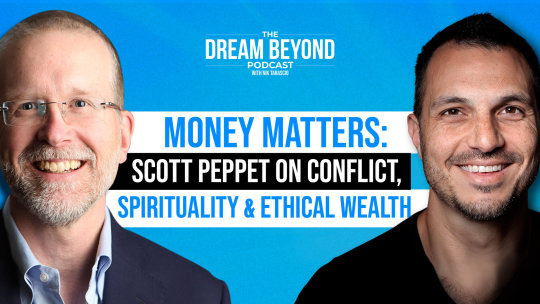
Scott Peppet
inheriting money's really complicated for people, and often very damaging, and very difficult if you live bunch of money to your kid or your grandkid. And there's no preparation for that. And there's no training and there's no learning. And there's no, there's no conversation of like the one we're having about, what is this? What is its purpose? What is it going to do in your life, you're essentially handing that kid a loaded gun, and saying, figure it out as you go.
Nik Tarascio
Today, we're going to be talking about something that is probably one of the most taboo subjects, especially in America, you're not allowed to ask someone how much money they have, what do they have in the bank. And really, it's a conversation that dominates so many of us either chasing after it putting all of our time into getting more defining our self worth by the size of our bank account, or the size of our business. Those of us that inherited money feeling guilty, we deserve it. What would people think if they knew how much we had, if we don't have enough, you know, we are afraid of what the world's gonna do to us. It's so it's so interesting. It's a it's a thing that takes up so much of our life, we don't really talk about it. And so this, this next person is probably one of the few people that can really speak on not just the money piece, our relationship to the money, but really the spiritual aspect of it. What does it mean in our life? What does money mean? What are we supposed to do with it? And how do we find true fulfillment? Despite our relationship, our complex relationship to money?
Welcome to the dream beyond. I'm your host, Nik Tarascio. I'm a CEO, musician, an overall seeker of Truth, inspiration, and simply put, how to live the most fulfilling life possible. Growing up surrounded by extremely wealthy and successful people gave me unique and unfiltered perspectives of those who have seemingly made it through on the dream beyond, we're letting you in on what it really takes to achieve your dreams. What happens when it turns out your destination isn't the promised land, you are expecting how to process the lessons from your past while mapping of course to true fulfillment. Let's get started.
Hey, guys, I'm here with someone who for 18 years was a professor of law at the University of Colorado, he focused on bargaining dispute resolution transactional law and the complexities of multi generational family enterprises. He also serves as president of a family office in which he's part of second generation. He speaks regularly on the topics of family offices, private trust companies and intergenerational leadership. And he's also an ordained Zen Buddhist priest, which I think is so cool to have that broad swath of experience. Please welcome Scott tablet to the show. Thanks for being here, Scott. Awesome. So I would love to dive in with kind of your earliest relationship or earliest memories to the concept of money and wealth when when you were young, or a child, for example.
Scott Peppet
That's an interesting question. I not sure I remember. The very first experiences I remember. So my, my parents were sort of Midwestern. You know, kids who first in their families, both to go to college. And my dad was a management consultant. He ended up working for Pete Mauer such became keep KPMG. And so they did incredibly well, by any standard they had in their heads of what they could have expected. Right? They, I think they they succeeded far beyond their wildest dreams, but a very, very nice or upper middle class, you know, professional life. I remember probably the earliest memory I have money was my, when we used to ask my father where money came from, or like, how do we pay for things? He would say, he came from the sky. Like it was the somehow it like, you know, arrived. And I remember in retrospect, thinking about that, and thinking later, as an adult, that it was clear that it wasn't something he was very comfortable talking about. Right? It was, it was like an answer that made it sort of ended the conversation, right, it just sort of money kind of appeared. But it wasn't something you know, I was privileged to not have to worry a lot about money growing up. Unlike the two of them, and they when they were growing up. My mom was raised in a boarding house. So I mean, like they had grown up in relatively very different circumstances. But it wasn't until I was you know, going to college with young adult that I started really thinking about money and and how it worked.
Nik Tarascio
It was part of your upbringing, this concept of money coming from the sky. I've never heard that before. That's a really interesting idea. And I'm wondering if that in any way influenced your path in college or I mean, how did you end up going down this road of getting involved in you know, kind of family law and and transactional, all that kind of stuff.
Scott Peppet
So I was a Peace Studies major as an undergrad I grew up in part of my life. And I was very young we grew up in, in France, and it was the 70s. And the Cold War was happening and conflict was a real thing. And World War Two, was still a very real memory in Europe, when I was little. And so I think a lot of that influenced me, and I was very focused on conflict and conflict resolution in college. And then when I went to law school, the whole thing I didn't think a lot about, you know, I've always, for whatever reason, money was never particularly interesting to me as a, like, I'm gonna go out and make a lot of money, it was never a real goal of mine, I always thought that I wanted to teach, I always thought that I wanted to do something in the conflict, world to make the world, you know, more peaceful. And so that was really always the vector that I was on was, was a more academic vector. What's always been weird about my life, or my karma, or something is, I've always ended up attracting financial capital or ending up in these contexts with a great deal of financial capital, working with families that had, you know, family businesses, or family wealth or family foundations and then marrying into a family with a large family enterprise. And so I don't know why that is. I'm not sure how that happened. Exactly. But I've always found myself in those contexts, which is a little strange.
Nik Tarascio
Like, so how did how did your relationship and as an adult, and even through this work and managing conflict? How did your relationship to wealth start to develop on its own?
Scott Peppet
It's a good question. I mean, I think that, you know, I went to law school and I had this conflict related business that I ran, I was a consultant that I worked with all kinds of different organizations doing conflict management, and conflict resolution, you know, communication skills, negotiation, all that stuff. And so I always felt in my, let's call it in my 20s, or in my 30s, like, I could make enough money. Like, if I needed more, I could go make more, because I was essentially working on a kind of per day basis, right? So you needed more, you had to go find more clients and work more days, I think that the reality is I always was more focused on human capital than on financial capital, just as a human being right as a person. So I was a teacher, I wanted to be a teacher. I was a conflict. person, right? So I was a mediator and a conflict resolution expert. And so my whole thing was trying to get humans to, to be less confused and right to figure out how their way through conflict in a way that was less damaging to them and to others. And so human capital was really always the thing that was more interesting to me than financial capital, financial capital, I think, for a long time felt not toxic, but sort of risky, right? Like it was a thing and it existed in the world, and they had to deal with it. But like, I was never attracted to the, to the Wall Street world, I was never attracted to the big law firm world, you know, we're where the money centers are. I was always much more attracted to human potential and human growth, and, and all of that, and my Zen practice, and my Buddhist practice was probably part of that, too. And it wasn't until much later that I think I kind of combined to reconcile those things, most likely.
Nik Tarascio
Yeah, it's it's interesting to also, you know, in my mind, I think about how conflict often centers around money. Yeah, it's like when you think of in family, or even, like, so taboo, I often talk with friends about that, where it's like, if I want to offend someone, I can ask them anything about their sex life, their politics, their political leanings. But if I'm like, How much money do you have? Yeah, it's like, whoa, whoa, whoa, take it easy, buddy. We're not allowed to talk about that. Yeah, it's interesting that it's kind of the the one big black box we have at least least in in the American way, you don't really talk about it. And I think of like, when I when I play out a lot of the conflicts I grew up around. I imagine a lot of that was somehow related to me who got more money or, like, you know, if someone died, and we were trying to pass something down to the family, all the fighting that happens when people are trying to figure out how to divide an estate.
Scott Peppet
Yeah, I don't know that it's true. I can't verify the quote, but I've heard it said that Freud said, sex, religion and money were the three big taboos. And that money was the, you know, the most extreme of those three that you could, people would talk about the other two, way more than they would talk about money. I think it's true. It's true in our culture. You're right, people. People will talk about almost anything now. But they very rarely want to talk about how much they make, how much you make, how much you have, how much they have, where it came from. And yeah, I mean, the conflict thing. Money is a proxy for all kinds of things, right? I mean, money is a proxy for love. Money is a proxy for attention in families, you know, where money can be used in a lot of different ways that isn't always very healthy, and leads to lots of calm flecked where you're arguing about the money. But really what you're arguing about is, Did mom love me more? Are you more, you know? Or Why did dad pay so much more attention to you when we were in high school, and even fighting decades later over an estate plan or something? Because it's a proxy for all of that.
Nik Tarascio
My my curiosity goes to a comment a friend of mine settled a long time ago was money always finds its way back to its rightful owners. And I think he was really alluding to like, yeah, you could win lotto you could come into a bunch of money, but it's gonna go back to people that understand how to hold the energy of it. And I'm wondering like, is, is the ability to manage conflict, somehow tethered to the ability to hold lots of money? Or are there other behaviors or characteristics that you'd say people that hold a lot of money and keep a lot of money has to be able to be good? Oops?
Scott Peppet
Well, I think your friend is referring to the basic principle of entropy, right? I mean, the universe is an entropic place. And so the reality is, money is just, you know, aggregated energy and material for right. It's essentially energy. This is from my, my great friend, Jay Hughes. But money is essentially just energy that's been transformed into matter and stored in physical form. And energy, as we know, is in Tropic, right. So the generally, the systems get colder over time. And so I mean, that's a incredible abbreviation, but essentially, right. And so, I do think that, you know, the old adage is that, you know, shirtsleeves to shirtsleeves, and three generations or whatever, it's, it's hard to concentrate energy into matter like that, and store it and have it remain in one place with one person or one family or one one business even controlling or enemy. If you look at the s&p 500. Right now, how many businesses are on the s&p 500? That were there 100 years ago, it's a very small number, for the same reason. And so, to a certain extent, you know, I think your friends common is probably right, which is money, I'm not sure if it gets back to the rightful place necessarily, but it tends to dissipate, right, it tends to go back to the river back to the mean, and a lot of and that's probably, hey, actually, right. I mean, that's probably not a terrible thing. Lots of families and lots of businesses are fighting the uphill battle of trying to prevent that or trying to, you know, maintain what they have. And that's also okay, but but it is, it is, I think, endemic in, in the way the world works, that it's hard to do. And you're fighting against natural forces, including just that families, you know, most families, for example, that have great financial capital, it's because of some person who started the business, right? And did really well, or maybe multiple generations of people. But that talent, that skill, that luck, that ability, doesn't always, you know, get replicated in many, many future generations highly unlikely, with what a great wealth creator has done. And so it's highly unlikely that someone else is going to come along and continue that. And so again, you know, family systems doing what they are, it's typical, that the financial capital starts to dissipate. And I don't think that's necessarily, like I said, I don't think that's bad. I think it can be painful, right? It can be difficult for people, and it can be disorderly and chaotic and cause conflict, and all kinds of things, as it happens. And sometimes, you know, it happens more violently than others. You know, and, and, and sometimes it happens more peacefully, or more commonly, but But it's, I wouldn't say it's inevitable, but it's pretty typical.
Nik Tarascio
So the, the Buddhism piece of this Zen Buddhism, I guess, you know, as I was reflecting on your background, and your story of, you know, I just always assumed I could just work another day and make more if I needed to, that whole, like, they'll always be enough as kind of what I hear in that. And that's a place I've gone back to myself as I want to get to that space of can I just believe there always be enough. But the flip side being the pain of setting a bar of saying like, these are now my financial standards, and this is where I relate to the world and the energy I need to run it. That pain of the backslide. does Buddhism offer any perspective? Or does your spiritual practice offer any perspective for someone if I can, it's great that you have a, you may not be able to keep it. So there's value in learning how to come to peace with the fact that it may exit at some point, and you may not want to resist that process too much. And
Scott Peppet
it's funny that that's your follow up question, because as I was speaking, in a prior answer, I was thinking about the basic principle and Buddhism of impermanence, right? I mean, one of the very basic lessons of, of the historical Buddha is The that, that everything is impermanent, everything you know, everything you love everything, everyone you love, every thing you've built, it's all gonna go eventually, right? It's all gonna crumble and, and, and disappear. And that's an incredibly painful thing for humans, because we're attached to things, right? We love our family, we love our house, we love our gold watch, whatever, whatever we love, and are attached to will will vanish eventually, you know, none of it will last. And that's, you know, one of the Buddha's awakening insights was to see that impermanence in the world. So I do think that I mean, again, sort of laughing at myself in the prior answer. You know, it's, it's, if you're not, particularly if you're not clinging to it, the Buddhist practice is essentially a bow, not clinging to anything, right? That there is no, there's nothing to attach to, it's not even turtles all the way down, it's emptiness all the way down. And so it's it's a much the sort of Buddhist insight is that it's actually a much saner and healthier place to live from, if you can be honest with yourself about that impermanence in the world. And it makes you open your eyes to the wonder of what you have at this moment, which is your health and your body and your love, and the people that you care about. And even though they're all gonna go and you're gonna go, you that brings enormous joy in if you can recognize it, but a lot of the time we live, you know, denying that back, right, trying to pretend that that's just not the nature of things. And, you know, we build up cryptic bank accounts and gripping houses, and, and gripping gravestones, and all these things, and none of it, none of it helps sight, the reality that at the end of the day, everything, you know, everything is impermanent. So I do think it's easier, maybe, for a Buddhist, or someone in that sort of practice tradition, to not hold quite so tightly to material things. I mean, I would hope it is, that doesn't mean being an aesthetic, it doesn't mean you don't like the things, it doesn't mean that having those things isn't nice. But it but it might change your relationship to that seeing or that wealth or that financial capital a little bit.
Nik Tarascio
I just started tapping into I think it's Pema children, I believe is her name, how you live is how you die. And so I'm really interested in this idea of impermanence. And it's something that I've heard from a lot of people in my business community and I know I deal with this a lot as I've kind of been on this spiritual path and meditating and interested in in different aspects of Buddhism. But the question always comes up is like, if I really come to terms with this idea of impermanence, or even, you know, embrace the idea that I'm dying, well, I stopped caring about money, right? Like, I don't want to stop caring about money. I don't want to get out of the game. And I hear a lot of that of like, I almost refuse to feel connected to the world around me and find that spiritual peace because I'm like, Well, what the hell am I gonna do anything for at that point? Nothing matters. I'll just be I'll just be sit in the sand enlightened on the streets in New York. Yeah,
Scott Peppet
no, I, I get that. Look, I there's a phrase that or a word that I think is helpful there, which is, I don't think that Buddhist practice or any kind of spiritual practice or meditative practice, whatever, whatever tradition it comes from, is about what I would what I would call calm ism. Right? It's not about you know, we use the word Zen in our culture as like, Oh, you're so zen, you know, you're so and what we mean is like, You're so calm, so chill. You don't get mad, you know, you're like super. And, and, and Zen practice. And most meditation practices, do change your relationship to your emotions. And so people can be quite calm. But Zen masters are not particularly flat. Right? They're not, they're not, they're not disengaged with the world. You're not zoning out, you know, and just sort of sitting in this Nirvana, Ik, blissful state. In fact, most masters that you see or read about are massively engaged with the suffering of the world, right and with the joy of the world. My Zen teacher was the weirdest dancer I've ever met. Right? I mean, he could get in there and go for it. And and the truth is same is true. Probably the best non Buddhists, of course, is His Holiness, the Dalai Lama, and Anyone who's ever seen him or seen a video of him, you know, he's a very joyful, engaged human being. He's not just sitting on a lotus flower, you know, wishing the world well. And so I do think that there's an initial question of like, well, gee, if I calm myself down so much, does that make me while I flatten out? Right? Well, it all just become like super groovy no matter what? And the answer is, look, kind of, but not really, right. You might be more engaged in the world, maybe differently, maybe slightly different goals or priorities. But I don't think the why I believe that that the goal is not detachment in that see, again, the words get real weird in the West for us, because Buddhists will use words like detachment, or dis attached, you know, detaching from things. And we hear that and we think, Oh, that means just like, zoning out, right. Like, and, and we're not trying to train a bunch of people to go to a Zendo or go to a monastery or whatever, and just zone out. If that's what we're trying to do. It's, that's not a particularly interesting project. Right. What we're trying to do is wake up. And what does that mean? And I think I think that that process engages not disengages, ultimately. But there is a, an A, there's a little worry about Will, am I just gonna I hear the worry, am I just gonna disengage? And I think the answer is no, if you're just disengaging, something's going wrong. We also hear like, you know, meditative practices about selflessness, or about changing your relationship to the ego. And that's true. I mean, at the at that most fundamental level, the the Buddha's, and many spiritual practices, core realization has to do with you not being quite what you think you are, right, that you're maybe a little less important in the story than, then maybe we are trained when we're growing up. But that doesn't mean you're going to end up just sitting staring at a wall in a in a meditation hall, you know, beat voit vacant, you're going to still wake up in the morning and need to do something. And so trying to do things that don't hurt people would be a good place to start. And trying to do things that actually help people would be a really good second place to start. But you're not going to end up doing nothing. Right? There is no not.
Nik Tarascio
So taking this background. And again, I imagine a lot of the people that are listening are in a space where they've generated a lot of wealth and their business, or they are multi generational. And I'm assuming you've dealt with a lot of those people that are like, hey, what do I do for the future? Or I have kids that I don't want to ruin with all of this wealth, and it transfers? Do you bring some of the spiritual perspective to the way that you have those conversations? Are those two separate worlds in your mind?
Scott Peppet
They're not two separate worlds, in my mind, you know, it's a delicate thing, because people come from all kinds of different spiritual practices and stress traditions or no spiritual tradition that they identify with. And so it's not something I don't typically lead with. But these conversations, I mean, as you said, at the beginning of the podcast, these conversations about money, take people to spirit very quickly, in a lot of conversation, right? Because Because money is tied to values, it's tied to purpose, it's tied to goals, it's tied to what they want for their children in their family. And so you're very quickly into the realm of the meaning of life, and the meaning of things, and not in the realm of taxes and balance sheets. There's taxes, a balance sheet, you know, to deal with and a lot of lawyers and all that stuff. But very quickly, what most people really want to think about is, is this going to hurt me? Is it going to hurt my children? Is it fair? You know, we live in a very unequal, you know, very difficult moment in in terms of money and wealth and the distribution of wealth. And people are wrestling with that. You know, all people are wrestling with that wealthy people are wrestling with that just like everybody else. So there's questions about what do I do to make an impact? How do I use what I've gotten through good fortune or whatever to be beneficial to others? Those are all spiritual questions. Those are all deep questions, right? about who we are as human beings and what we're doing here. So I don't see them as separate because everybody ends up in those same conversations, whichever route they get, you know, they follow to get
Nik Tarascio
one of the things you told me about in the past, which I never thought about it this way. You had talked about the idea that when you give someone a big inheritance, it's a little bit like I forgot, I don't know if he said it was nuclear energy or dropping a bomb or something like that, but I'd love to hear more about what you've seen and how it actually does. impact people as people are thinking about, like I wanted to make all this money be I don't want to just give it to my kids willy nilly. I don't want to just blow up their life.
Scott Peppet
Yeah, I mean, look, I again, with the caveat that this is, you know, a seriously first world problem, right? I mean, it's it's easy for people in our society in our culture right now to say, look, the poor rich people, you know, what are they so worried about and, and there's validity to that. And inheriting money is really complicated for people, and often very damaging and very difficult. i The the metaphor I probably used was a loaded gun, or some sort of, yeah, I mean, look at you, if you live bunch of money to your kid and your grandkid. And there's no preparation for that. And there's no training and there's no learning and there's no, there's no conversation of like the one we're having about, what is this? What is its purpose? What is it going to do in your life, you're essentially adding that kid a loaded gun, and saying figure it out as you go. And it's not so easy. And it's not so easy in a couple of ways. Sure, money makes material things much easier. So they're not going to starve, and they're not going to have to worry about where they live and how they're going to pay their rent. And that's a big deal. And it can be very demoralizing, it can be very degrading of someone's sense of self worth, to have money that they didn't earn. And that they're somebody else earned. Right? And that they're not, they might feel quite ashamed of, or at least ambivalent about, right? They're not sure. It's really okay. And like, I mean, I need way more 20 Somethings and 30 Somethings who have inherited some money, pick the number of zeros, I don't think it really matters. And who hide it, right? You hide it from their friends who hide it from their peers, who hide it from their significant others, you know, the people they're dating, because they're nervous about what it says about them, or what how it's going to be perceived, or the issues is going to raise?
And that's not good. And it's not, you know, you're not living an integrated life, if you're hiding all that stuff. And so again, you know, it's easy to say, well, poor, rich, good, you know, they'll figure it out. And, and, and, okay, but but the thing for me that's meaningful about this work is, look, the reality is, money does concentrate energy and material form. And it's not distributed equally, right. Okay. And we live in a society where we say, you're free to make money, as long as you do it legally, and you're free. If you've then amassed more money than you use in your lifetime, you're free to leave it to your heirs, as long as some of it goes to the government, right? And we incentivize people to give it away, but but you're allowed to leave some. So as long as we continue to live in that world. The the downside of inheritors, who are uncomfortable or, or have not integrated their financial capital into their lives in a real serious way where they feel ownership is they don't do anything with it, they end up sort of frozen and sort of stuck, right. And this is, I think, a spiritual challenge. Because they, you know, the social trope, or the social sort of story that we talked about is, oh, the trust funders, right, they're gonna go out and they're gonna buy Ferraris, and they're gonna, you know, blow it on champagne at clubs in New York, and there are some who are doing that. But the vast majority of the ones that I met, are not doing that what they're doing is they're frozen. They're stuck, not wanting to screw it up, not wanting to look weird to their peers, not wanting to really cut it, do anything with it, and they live this very kind of constrained life. And it's like we were we, as a society, we actually want you to own this so that you will go do good stuff with it, right? Like this is back to your engage disengage question, like, we want you to engage, we want you to feel like you own this enough that you can use it for climate change or use it for to alleviate suffering or poverty or, or whatever the thing is, you know, that that that you're going to engage with, we don't want you to leave it in some investment account for the next 100 years. And never feel like you can use it and redeploy it into the world. And so that's why it matters, right? I mean, I, I said to someone the other day, you know, we live in this really screwy moment in history, where we have climate change. On the one hand, the greatest threat probably that we've ever faced as a species or as a planet. And simultaneously, we have this massive wealth inequality. And I said, What if that's actually a blessing, where it happens to be that you could get, I don't know, some ungodly percentage of the world's financial capital organized by getting 1000 people in a room I mean, I don't know that it is. But I bet if you got the 1000 1000 people in a small arena, you could have 70% of the world's financial capital represented. Now, you can say, that's really disgusting. And that's terrible. But maybe since we have a collective action problem and climate change, the exact thing we need is to be able to organize all that financial capital really efficiently. So maybe that's a blessing, right? Maybe that's actually an opportunity. But not if all those people are frozen, and don't want to talk about any of this, right? Because they're never going to engage. What's
Nik Tarascio
the antidote? For those people being frozen? How do you how do you approach that?
Scott Peppet
Yeah, that's a great question. I mean, the inheritors that I've worked with, and talked to and counseled and whatever, I think the first thing is to start taking account of how they actually feel about their money or their financial cap, if they are hiding it from their friends, if they are, you know, I talked to somebody yesterday, who said, her son takes, you know, the cheapest flight home from university, and usually makes like three stops, you know, because it's like, the cheapest way to get home. And, and she said, What do I do about that? I said, you don't do anything except talk about it. Right? Like, start with? Why does this feel better to you? And again, I don't really care. I mean, if you want to take the cheapest flight, or the, or the direct flight, what doesn't really make any difference in the world. But at MIT, something's going on with that person, right? Like, he's making a choice. It's not totally clear why that feels impactful. Like, I'm not sure you're doing anything better from a carbon point of view. That's really big a difference in the world, you're still buying a ticket, right? Like, but the real answer was, she said, you know, he doesn't want his friends to, to know that you can afford the direct flight. Well, that's, that's emotionally harmful to him, right? He's, he's hiding something. And so the first place is to just start taking stock. What are the ways that this is leading you? Because because he's being dishonest. I mean, that's just let's put a point on it. Right? I met another inheritor who used to, she lived in an apartment in New York, and that her parents owned and she worked in a startup, which is I used to go out with my friends, because my office was right near where I lived. But at the end of the day, when we go out for drinks, or whatever, they'd all get on the subway to go back to Brooklyn, and I would go into the subway station, and then leave by a different exit, so that they didn't know that I lived in Midtown, I don't really care, except that you're being dishonest, right? That and you have as one of your core values, being honest and transparent with people, and you can't be if you're hiding this part of who you are. So, so one part is just beginning at the How are you behaving? How are you acting?
And is it actually aligned with who you said you want to be? And, and? And often the answer no, right? You might be spending too much. You might be hiding things. You might be whatever. But you might say, oh, yeah, I really, you know, I really care about making an impact on the world. But when I look at what you actually give away every year, it's not very much, right? And you're not very focused on it. And you kind of do it half assed and Okay, wait a minute, right? So let's try to figure out like, where are you in this journey of your relationship to financial capital? That's, that's kind of the beginning. I think. And, and often what we discover is, well, it's really complicated, right? The person, non person, let's say, or older person, it's really complicated. They have assumptions, they have stories, they have rules that they've inherited from their parents or their grandparents. And they have to reexamine those things. And really think about, well, is that how I want to live? There's no absolutes, right? There's no formula for how to do this. But one way not to do it is to be living counter to who you believe you are, or want to be in the world. That's, we know that's not going to be not going to feel good. That tends to get people somewhat unstuck. The other one, that's real simple for me is what brings you joy. You know, is this stuff bringing you joy? Like, are, you know, going to these meetings and assessment, that advisors and whatever, is it making you happy? Is it making the people around you happy? Is it making the world better? Are you are you happy with this? And very, very often even the people that we would describe in this sort of social story of like, the rich inheritor who's spending too much, they're often very unhappy. And they know they're unhappy. They just don't seem to want to identify with that right. They got to kind of So they have to slow down, and they have to really take stock of, of where they are. And that tends to then lead to conversations that get them less stuck. Right. Okay, so what does feel genuinely joyful to you? Well, when I help people are when I would ever want to when I run my business or when I, you know, okay, let's do more of that, right, let's figure out a path where you're doing more of that and less of this other set of behaviors that is not really serving you, or anybody else.
Nik Tarascio
Have you seen where people? I mean, let me back up. I think a lot of people I've talked to especially I grew up middle class, I think the dream was like lotto ticket when sit by the beach, life's gonna be amazing, right. And I'm imagining that you've met people that have that opportunity that had a pretty ordinary life, and then suddenly had the ability to go and hang out on a beach until the end. And I'm wondering if it was as dark of a journey, as we've heard about for a lot of people have like, wow, this is, I feel like my life is meaningless. Very
Scott Peppet
few people do it. I mean, that I've met, you know, the beach gets really boring really fast. Most people I mean, I don't know I, I like the beach as much as anybody else. But I can't stay there longer than you know, an afternoon before I start to get, you know, and I can sit in a meditation hall for like days and not do anything but a beach like starts to get a little bored. I think that a lot of this depends on what you think human how you how you really think humans are wired, right. And, for me, humans seem to be mostly wired around. Love creativity. And, you know, generativity, doing things in the world, for themselves and for their families and for others around them, that lead to community lead to connection lead to, you know, all of those positive emotions, we're social creatures. So yes, there's there are people who win the lotto, and go build a big beach house, and sit on the beach. But pretty often, most of those people that I've ever met, are back in their church or their community center, or whatever, pretty quickly, like looking for something meaningful to do. Because the beach stops being meaningful pretty quickly. I mean, I know a lot more folks with a lot of financial capital, who are working 60 hours, 70 hours a week, again, I'm not crying, you know, I'm not crying for them, they have a really nice life. And there's lots of people working 60 or 70 or 80 hours a week who don't have those material benefits. But it's not as if money 10 always just leads people to go cool. I'm done. You know, just bring me another pina colada. Most of the time, they're trying to figure out, what do I do next? You know, whether it's charity, or starting a business, or helping their friend or whatever, what do I do next? That makes me feel like I'm leading a meaningful life?
Nik Tarascio
Yeah. Which really kind of teased me into my kind of the culminating question is, you know, what is that connection between fulfillment and wealth. And that's really what this podcast is all about is like, a lot of people climb that. Climb that first mountain of like, I just want to get all the external markers of success, I want to have the money in the bank, I want to know that I could just, you know, get that Oprah money, right? And then getting there and going like, well, you know, again, I'm in New York. So I'm surrounded by people that do have the upper money, and they often have seemed very unhappy, very lost, very confused, kind of that stuck energy that you were talking about on some level. And I just wonder, what, what, what thoughts you have on the connection between fulfillment and wealth? And I think you've already kind of illuminated on some of that, but I'd love to hear it. Kind of deeper. Yeah, I
Scott Peppet
don't think there's any connection at all, like they've been studying this right had the connection between happiness and money. And there's all kinds of studies trying to figure out like, you know, there was a great study for a while that people would say it could set it up. I can't remember who it was, but like more than $70,000, and it didn't matter, every incremental dollar was irrelevant. And I don't have any opinion on where all those studies are gonna come out. It clearly it makes a difference. If you can feed yourself and have a dry, safe place to live. Those things, those, those minimal conditions, obviously matter a great deal. But beyond that, do I think there's much correlation? No, I think I know very, very financially wealthy people who are incredibly happy, optimistic, loving, connected, empathetic, warm, growing, learning human beings. And I know and I know, very poor people who are the same, and I know the opposite on both sides, right? And so to all of us, so You know, I, I think that we've got different vectors here, right, which is human development as a human being? How are we doing? Right? Are we growing? Are we learning? How are you doing on that on that front? And then there's the material question of, of how you're doing web access to financial capital you have. And one of the things that I'm amazed at is when I meet really financially wealthy people who aren't really doing anything on this whole other vector, right, like their Freddie's. Not I mean, you could be holy moly, you have all this money, you could be investing in an incredible coach and incredible therapist and a nutritionist and like, you get the, or just giving to others or you could be, and the answer is like, yeah, and I haven't really done i That's like, not kind of my thing.
And so what what I've come up with is like, Okay, well, there's people who that sort of thing. And there's people who just kind of, that's another thing. And at least my take has always been, happiness seems to correlate much more with growth than anything else. Subjective transit, happiness, human beings, like to develop, they like to grow. They like to create, they like to expand, they like to learn, and they like to love, I mean, the big thing they like to do is love and create, right. And if they're doing those things are there and they're wired to do those things, then they tend to be more optimistic, happy people. And if they're sort of stuck, not doing those things, for whatever reason, whatever self story they have, no matter how much money they have, their subjective experience of happiness is generally lower. Now, I have no idea whether money inhibits or promotes that. But my own experience, that kind of growth, but my own experiences, it doesn't seem to correlate at all. Some people have lots of money and use it really well in those kinds of ways. And some people have lots of money and really don't.
Nik Tarascio
So for someone sitting on incredible amounts of wealth, whether earned or inherited, if they're not feeling that sense of fulfillment. Do you have any advice for them? Do you have any considerations for them?
Scott Peppet
Yeah, I mean, number one, don't I mean, I'm going to be nitpicky here. Don't use the word wealth to mean money, right? Wealth means wealth, wellbeing, as a holistic concept, your physical health, your mental health, your emotional health, your spiritual health, your social capital, your social relationships, your ability to love all of those things. That's wealth. And financial capital is a part of that material, belongings, material wealth as part of that. But wealth being wealthy is, is a much broader concept, your your previous podcast, guest, you know, you were talking about some of those things. So that's a mental shift in the use of a word, which is a little nitpicky. And again, and my friend Jay uses is is is partly the genesis of that, that movement, but it really does matter for people because they say, Well, I have everything. And I say, Wait, do you have anything like, your divorce and you're single, and you don't have a partner right now. And you're really sort of unhappy about that. And you've been having all kinds of physical health problems, and you can't seem to get your hands around them. And you could also be very connected to a community that really loves you and that you really low. So I'm not sure you have everything, you have a bank account. Like, it's nice, it's a nice bank account, but like, you can't actually go buy most of those other things. So where are you going to get them? Right? And, and we know that and like, this isn't rocket science, we know that. But we, as a society as a culture, we privilege financial capital over all these other forms of capital so intensely, that we kind of hurts surprised, like, Gee, I have a big bank account, but I'm miserable.
Well, and why is it surprising? Like, yeah, you have a big background, but you don't have good social relations. Because you're kind of an asshole, right? Like you or whatever. Like, you're kind of not a nice person. And you've never really come to terms with not being such a nice person. And nobody really likes you. So morning really surprised the rest of us that you're having a hard time. I think culturally, we've got to get over that surprise, right. We just have to. So so what would my advice be for people with a lot of financial capital? Man, my biggest advice is always seek out real feedback. The biggest deficit I see with financially wealthy people, is people aren't honest with them. Everybody's working for them, right? Every their friends, everybody's dependent on them, their kids, or their spouse, sometimes everyone's dependent on them in some kind of financial way. And so it's really hard for them to get real feedback about who they are, how they are, how they're behaving. how people perceive them. I mean, I I joke when I you know, I'm married into a business family and I always say, the day after I got married, I was so smarter, funnier and better look. Because some people laughed at my jokes more, you know, and thought I boy, everything I said seemed to be real smart. And that's, that's a crazy way to live. And so my advice is always how can you find people who will be honest with you really give you real feedback? And those are the that's the biggest deficit for a lot of these financially well off people.
Nik Tarascio
There is there. You know, I've thought a lot about this idea of I do we choose the life we're born into on some level, and I know that there are some practices that believe that I wondered if it is, you know, coming into a life where you inherit a lot of money, is there an ethical responsibility and a spiritual responsibility that comes along with that of do something with this? I don't feel guilt or don't feel unworthy necessarily. No, it's not it's, I can't get I can't shoot anybody into that. But is there kind of a like, Hey, this is your spiritual path, like learn how to be with us learn how to hold this energy and do something meaningful with it?
Scott Peppet
I mean, in my view, yes. But I would broaden it, I look, I think all of us in this life with an inheritance. We're, we're in human form, we're blessed with consciousness, we have opposable thumbs, you know, we have a whole bunch of things that that are pretty remarkable. And maybe we have financial capital, maybe we don't. But to a certain extent, I think we all have, at some point, I don't know if it's an obligation, but an opportunity to use what we have to be helpful, to be compassionate, to do things in the world that are helpful to others, you know, that one of the great Buddhist scholars said this is 1000 years ago, but said, wisdom is the womb of compassion. Right? You when you start to realize the, the, the essence of life, your only natural reaction is compassion for others who are maybe less fortunate, or who are suffering or who have less, less insight into how to live or whatever. And so I think that's true of everybody. And, and it happens to be that if you randomly get selected to be in to be born into a lifetime with a bunch of material wealth, well, then should you use that to to be compassionate? No, bother, you have probably, right. Seems pretty hard to make the argument that, you know, just because you randomly got selected in the genetic pool for that lifetime, that you just get to like, pretend that didn't happen. Right? Like it happened. You have this unbelievable opportunity. So do something with it. And I don't have a lot of judgment around. Wealth, I don't have a lot of judgment on any of it. I don't have a lot of judgment around what you do. So like, create a business employ people. Hallelujah, right, like, unbelievable way to help the world. Give it to charity, plant trees. And if you don't do anything with it, I mean, hard to do nothing. There is no, there is no neutral gear here. But if you don't play it very intentionally, I don't have a lot of judgment on around that either. Because I have a lot of empathy for the causes of that. stuckness. I mean, that's just part of I know, I know, lots of people in that place. And I don't envy that. But do I think it's all things considered better to engage than to disengage, either to be in first year or second year than in neutral? Yeah.
Nik Tarascio
closing question for you is, what is your dream beyond? Now? Great
Scott Peppet
question. I mean, my real honest answer is, I hope, that as a species, and as individuals, we can continue to wake up to the ways that we're harming ourselves and others and the planet, and ecosystem we live in. I hope that we can raise consciousness and be less confused. Most harm that I see in the world is caused by confusion. It's caused by people hurting each other, out of confusion out of small interests and ego that if they even could step back for half a second, they would say, yeah, that's not really what I want to be doing. And so I'm an eternal, naive optimist. But my dream beyond is that, that we can grow enough, fast enough, and wake up enough to flourish and survive. I'll say that this conversation, I mean, you and I started a conversation, whatever it was a year ago or something. And the connection between spirit and money is hard for people to talk about. And there aren't a lot of conversations about it. There are some, but not a ton. But I think it's really, really an important intersection. Because, like I said, there's just so much potential that can be unleashed, for human betterment for the betterment of the not just humans, but the planet and etc. If, if we can connect these two things, you know, put an end to certain extent, I don't think we have to connect them, I think they're inherently connected. We just have to recognize that, that that connection and and find ways to live in the world and use what we have, however much we add. For for positive ends,
Nik Tarascio
and it's beautiful. And I I would I'm gonna consider your answer a blessing for me to have this conversation more because I've more and more thought about it. I'm like, this must be really hard. Especially we shamed the people that don't have it, we shamed the people that do have it. We shamed the people that made it, we shame the people that inherited, it's like, I can imagine everyone's just stuck. Everyone's upset. And as you said, there's there's a real sense of confusion. So I very much appreciate your answer. It's a beautiful thing that you shared. And I hope to be having more and more of these conversations, thanks to the perspective you shared with me. And hopefully, people that are listening to the show also are like, you know, I've never really thought about those things. I've never really consciously thought of how I apply my spiritual beliefs, to the way that I relate to money. The way I create it the way I the way I share it, the way I create value in the world with it. So what a beautiful conversation again, I appreciate the support in it. And if anyone is curious to learn more about what Scott's up to, you could check out Scott epa.com. We'll put it in the show notes. And yeah, Scott, you're just you're such an interesting, dude. I really love the different worlds that you play in. And yeah, thanks. Thanks for sharing your wisdom today. Thanks
Scott Peppet
so much. Listen, it's been great having the conversation. I'm happy to talk anytime and yeah, I look forward to reactions. This is complicated stuff, and super interesting to talk about. Now, I
Nik Tarascio
appreciate it. Thanks so much. Thank you for listening to the dream beyond. I hope that you receive whatever message or inspiration you are meant to get from today's episode. I had a great time recording it for you. If you love the show, please take 30 seconds to subscribe rate and review it. That really helps get the word out. And if you want to connect with me, you can find me at
Instagram
LinkedIn
YouTube
#money#feel#world#wealth#conflict#love#financial#capital#live#working#family#growing#life#talk#conversation#human#impermanence#people#sit#relationship#fulfillment#success#book#dream#business#community#big
0 notes